
seatunnel
SeaTunnel is a multimodal, high-performance, distributed, massive data integration tool.
Stars: 9119
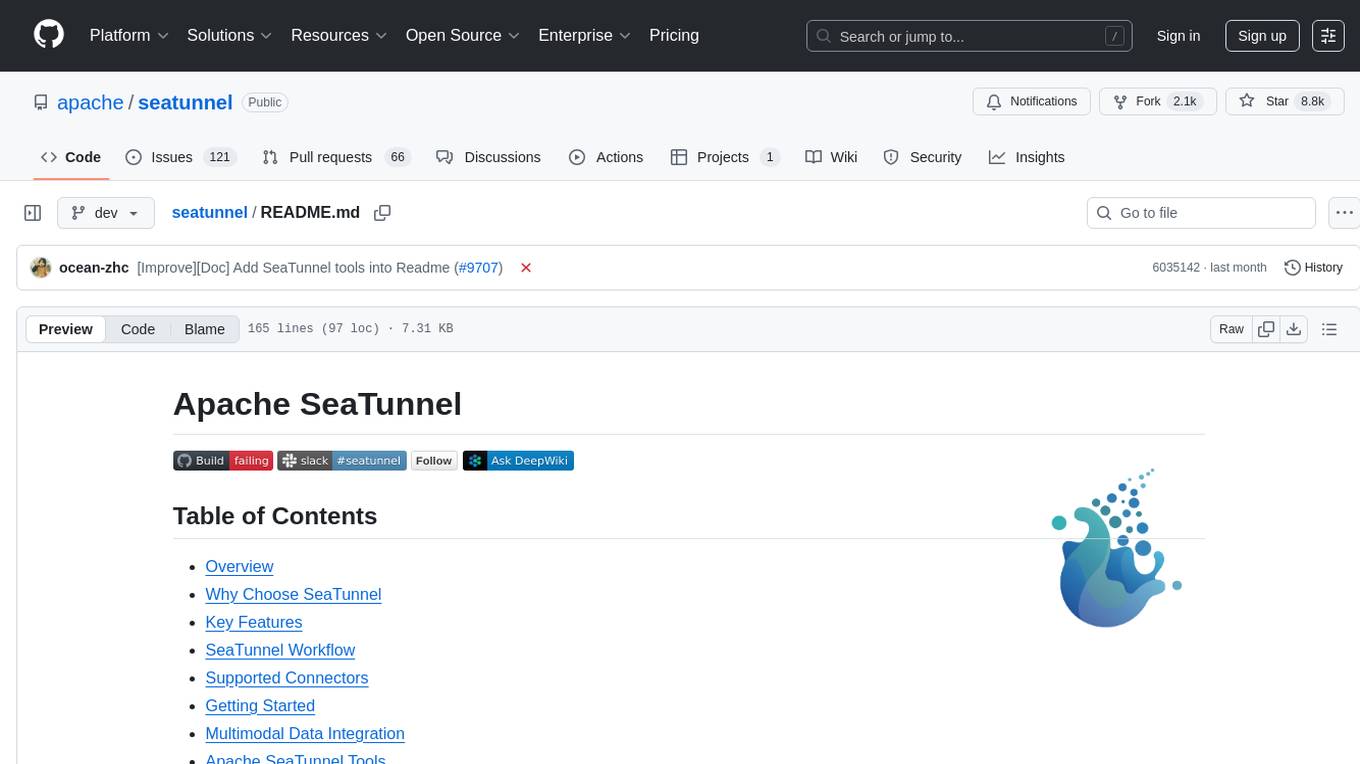
SeaTunnel is a high-performance, distributed data integration tool trusted by numerous companies for synchronizing vast amounts of data daily. It addresses common data integration challenges by seamlessly integrating with diverse data sources, supporting multimodal data integration, complex synchronization scenarios, resource efficiency, and quality monitoring. With over 100 connectors, SeaTunnel offers batch-stream integration, distributed snapshot algorithm, multi-engine support, JDBC multiplexing, and log parsing. It provides high throughput, low latency, real-time monitoring, and supports two job development methods. Users can configure jobs, select execution engines, and parallelize data using source connectors. SeaTunnel also supports multimodal data integration, Apache SeaTunnel tools, real-world use cases, and visual management of jobs through the SeaTunnel Web Project.
README:
SeaTunnel is a multimodal, high-performance, distributed data integration tool, capable of synchronizing vast amounts of data daily. It's trusted by numerous companies for its efficiency and stability.
SeaTunnel addresses common data integration challenges:
- Diverse Data Sources: Seamlessly integrates with hundreds of evolving data sources.
- Multimodal Data Integration: Supports the integration of video, images, binary files, structured and unstructured text data.
- Complex Synchronization Scenarios: Supports various synchronization methods, including real-time, CDC, and full database synchronization.
- Resource Efficiency: Minimizes computing resources and JDBC connections for real-time synchronization.
- Quality and Monitoring: Provides data quality and monitoring to prevent data loss or duplication.
- Diverse Connectors: Offers support for over 160 connectors, with ongoing expansion.
- Batch-Stream Integration: Easily adaptable connectors simplify data integration management.
- Distributed Snapshot Algorithm: Ensures data consistency across synchronized data.
- Multi-Engine Support: Works with SeaTunnel Zeta Engine, Flink, and Spark.
- JDBC Multiplexing and Log Parsing: Efficiently synchronizes multi-tables and databases.
- High Throughput and Low Latency: Provides high-throughput data synchronization with low latency.
- Real-Time Monitoring: Offers detailed insights during synchronization.
Configure jobs, select execution engines, and parallelize data using Source Connectors. Easily develop and extend connectors to meet your needs.
Download SeaTunnel from the Official Website. Choose your runtime execution engine:
- Most data integration tools support structured and unstructured text data, and SeaTunnel does as well. Simply refer to the desired Source/Sink to use.
- For integrating video, images, and binary files with SeaTunnel, please refer to the documentation for detailed instructions.
SeaTunnel Tools provides a range of peripheral tools, including Apache SeaTunnel Mcp Server, etc,please refer to SeaTunnel Tools.
Companies and organizations worldwide use SeaTunnel for research, production, and commercial products. Explore real-world use cases of SeaTunnel, such as JP morgan, S7, JDT, Bytedance, Tencent Cloud. More use cases can be found on the SeaTunnel Users.
Participate in this project in accordance with the Contributor Covenant Code of Conduct.
We appreciate all developers for their contributions. See the List Of Contributors.
Refer to this Setup for compilation instructions.
- Mail list: [email protected]. Subscribe by sending an email to
[email protected]. - Slack: Join SeaTunnel Slack
- Twitter: ASFSeaTunnel on Twitter
SeaTunnel enriches the CNCF CLOUD NATIVE Landscape.
Follow the Local Deployment on SeaTunnel website to get started quickly. Please refer to the Cluster Deployment
Official Documentation includes detailed guides and tutorials to help you get started.
You can submit an issue on GitHub Issues. Join our Slack community SeaTunnel Slack. More information, please refer to FAQ.
We welcome contributions! Please refer to our Contribution Guidelines for details.
For Tasks:
Click tags to check more tools for each tasksFor Jobs:
Alternative AI tools for seatunnel
Similar Open Source Tools

seatunnel
SeaTunnel is a high-performance, distributed data integration tool trusted by numerous companies for synchronizing vast amounts of data daily. It addresses common data integration challenges by seamlessly integrating with diverse data sources, supporting multimodal data integration, complex synchronization scenarios, resource efficiency, and quality monitoring. With over 100 connectors, SeaTunnel offers batch-stream integration, distributed snapshot algorithm, multi-engine support, JDBC multiplexing, and log parsing. It provides high throughput, low latency, real-time monitoring, and supports two job development methods. Users can configure jobs, select execution engines, and parallelize data using source connectors. SeaTunnel also supports multimodal data integration, Apache SeaTunnel tools, real-world use cases, and visual management of jobs through the SeaTunnel Web Project.
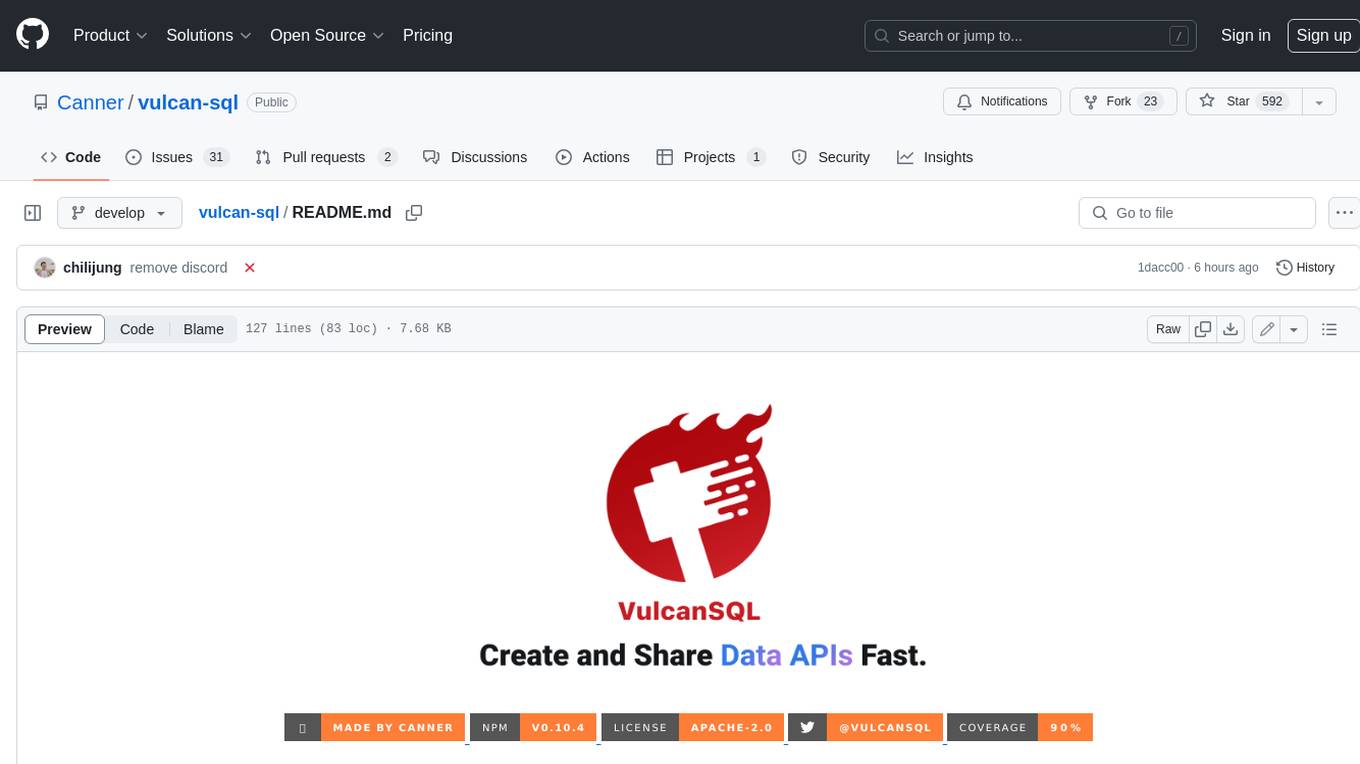
vulcan-sql
VulcanSQL is an Analytical Data API Framework for AI agents and data apps. It aims to help data professionals deliver RESTful APIs from databases, data warehouses or data lakes much easier and secure. It turns your SQL into APIs in no time!

Geoweaver
Geoweaver is an in-browser software that enables users to easily compose and execute full-stack data processing workflows using online spatial data facilities, high-performance computation platforms, and open-source deep learning libraries. It provides server management, code repository, workflow orchestration software, and history recording capabilities. Users can run it from both local and remote machines. Geoweaver aims to make data processing workflows manageable for non-coder scientists and preserve model run history. It offers features like progress storage, organization, SSH connection to external servers, and a web UI with Python support.
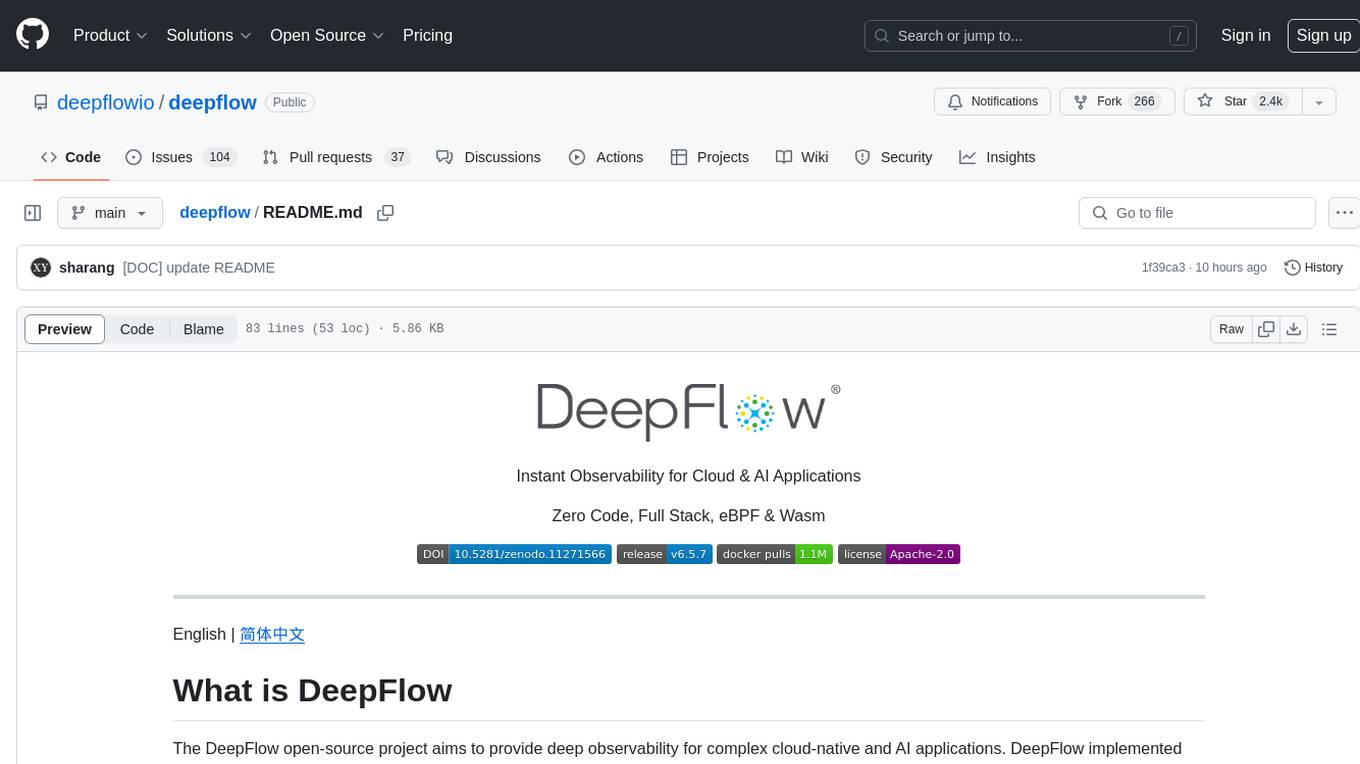
deepflow
DeepFlow is an open-source project that provides deep observability for complex cloud-native and AI applications. It offers Zero Code data collection with eBPF for metrics, distributed tracing, request logs, and function profiling. DeepFlow is integrated with SmartEncoding to achieve Full Stack correlation and efficient access to all observability data. With DeepFlow, cloud-native and AI applications automatically gain deep observability, removing the burden of developers continually instrumenting code and providing monitoring and diagnostic capabilities covering everything from code to infrastructure for DevOps/SRE teams.
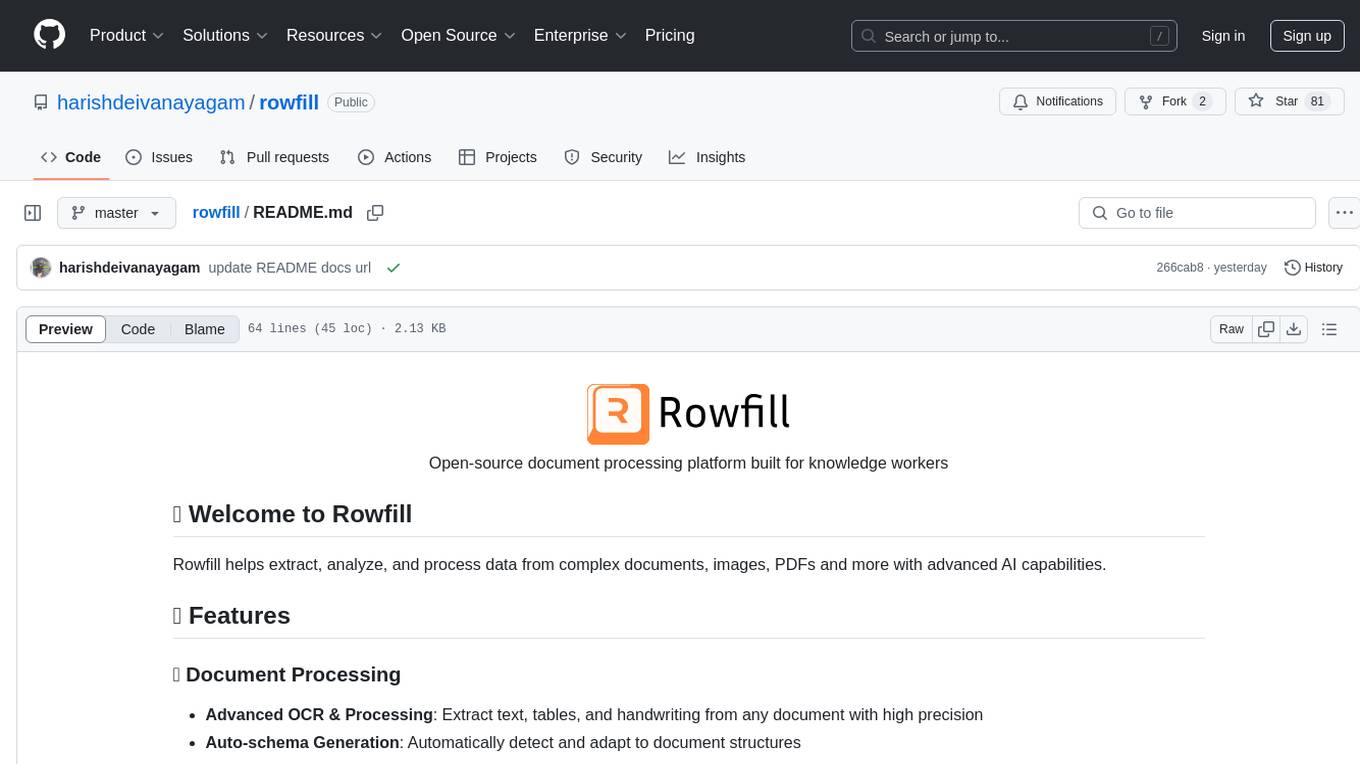
rowfill
Rowfill is an open-source document processing platform designed for knowledge workers. It offers advanced AI capabilities to extract, analyze, and process data from complex documents, images, and PDFs. The platform features advanced OCR and processing functionalities, auto-schema generation, and custom actions for creating tailored workflows. It prioritizes privacy and security by supporting Local LLMs like Llama and Mistral, syncing with company data while maintaining privacy, and being open source with AGPLv3 licensing. Rowfill is a versatile tool that aims to streamline document processing tasks for users in various industries.
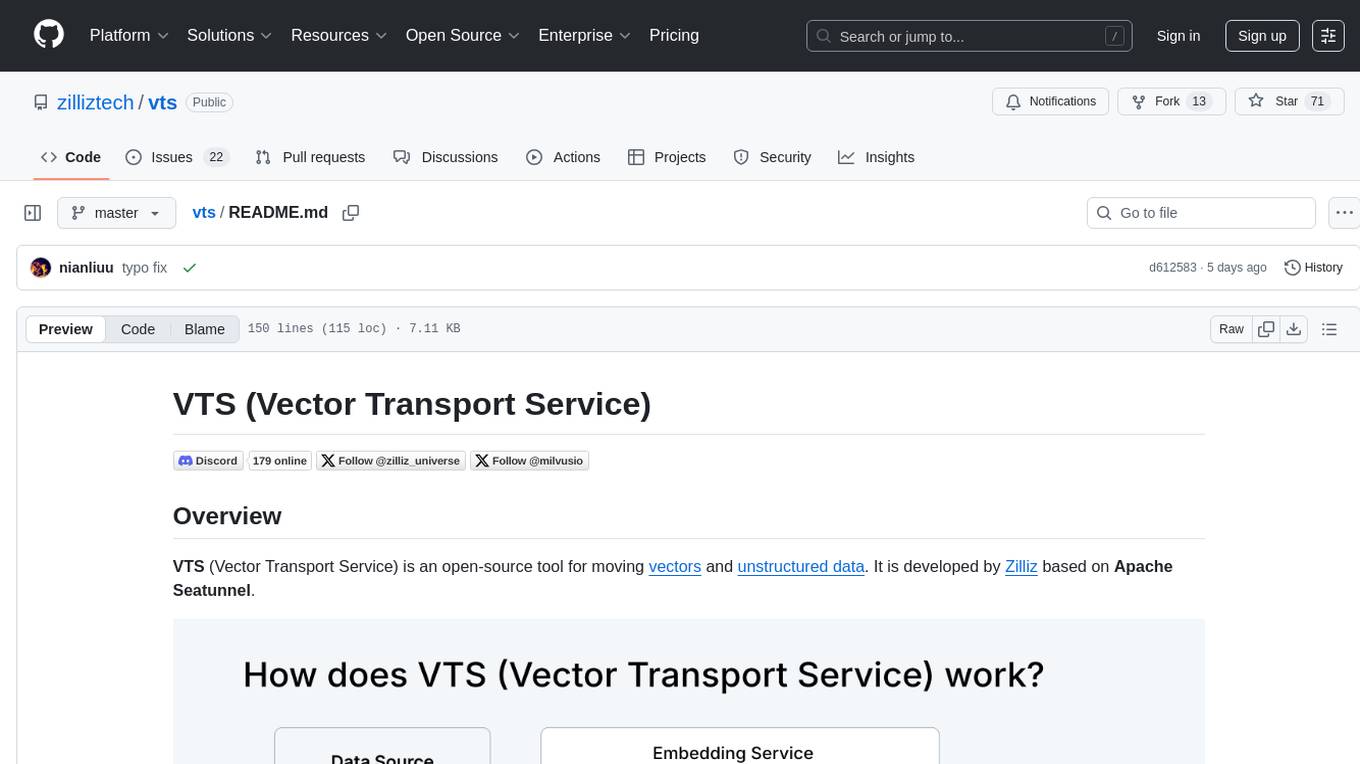
vts
VTS (Vector Transport Service) is an open-source tool developed by Zilliz based on Apache Seatunnel for moving vectors and unstructured data. It addresses data migration needs, supports real-time data streaming and offline import, simplifies unstructured data transformation, and ensures end-to-end data quality. Core capabilities include rich connectors, stream and batch processing, distributed snapshot support, high performance, and real-time monitoring. Future developments include incremental synchronization, advanced data transformation, and enhanced monitoring. VTS supports various connectors for data migration and offers advanced features like Transformers, cluster mode deployment, RESTful API, Docker deployment, and more.
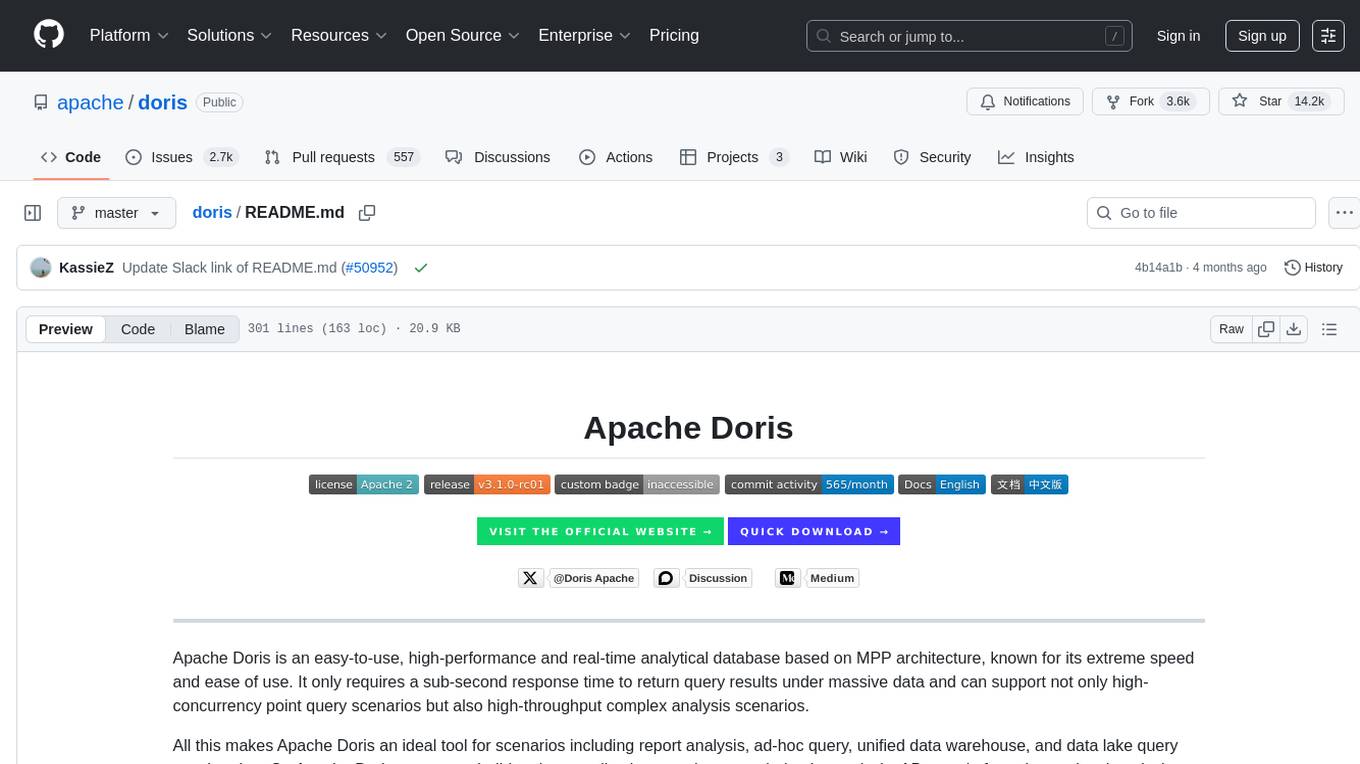
doris
Doris is a lightweight and user-friendly data visualization tool designed for quick and easy exploration of datasets. It provides a simple interface for users to upload their data and generate interactive visualizations without the need for coding. With Doris, users can easily create charts, graphs, and dashboards to analyze and present their data in a visually appealing way. The tool supports various data formats and offers customization options to tailor visualizations to specific needs. Whether you are a data analyst, researcher, or student, Doris simplifies the process of data exploration and presentation.
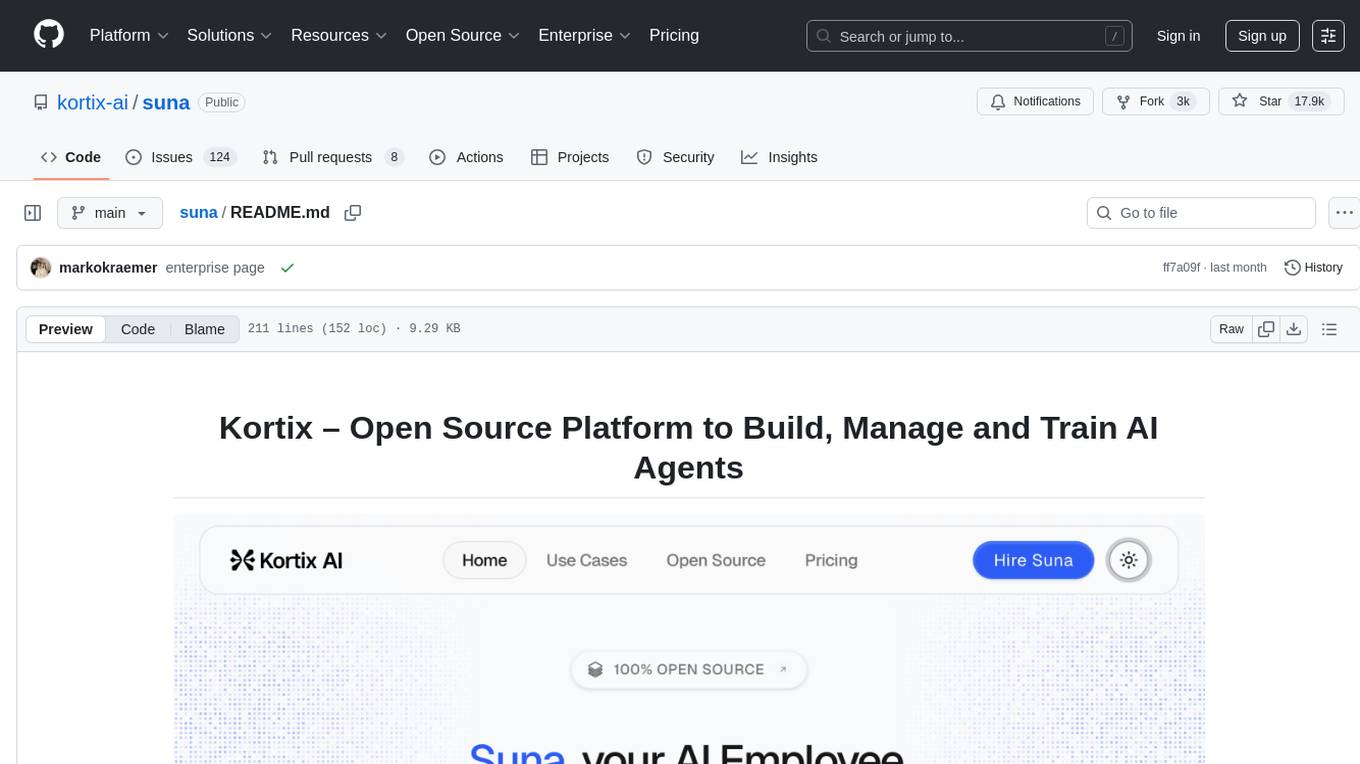
suna
Kortix is an open-source platform designed to build, manage, and train AI agents for various tasks. It allows users to create autonomous agents, from general-purpose assistants to specialized automation tools. The platform offers capabilities such as browser automation, file management, web intelligence, system operations, API integrations, and agent building tools. Users can create custom agents tailored to specific domains, workflows, or business needs, enabling tasks like research & analysis, browser automation, file & document management, data processing & analysis, and system administration.
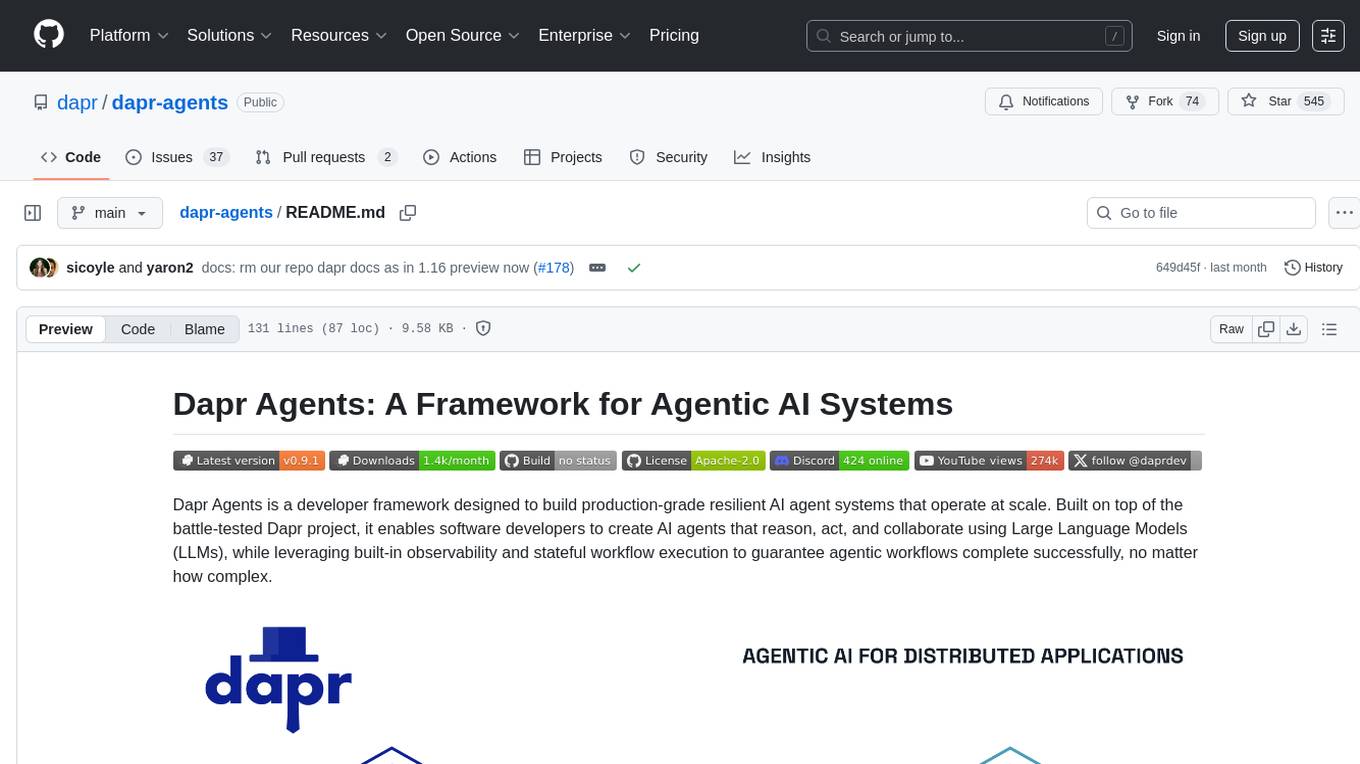
dapr-agents
Dapr Agents is a developer framework for building production-grade resilient AI agent systems that operate at scale. It enables software developers to create AI agents that reason, act, and collaborate using Large Language Models (LLMs), while providing built-in observability and stateful workflow execution to ensure agentic workflows complete successfully. The framework is scalable, efficient, Kubernetes-native, data-driven, secure, observable, vendor-neutral, and open source. It offers features like scalable workflows, cost-effective AI adoption, data-centric AI agents, accelerated development, integrated security and reliability, built-in messaging and state infrastructure, and vendor-neutral and open source support. Dapr Agents is designed to simplify the development of AI applications and workflows by providing a comprehensive API surface and seamless integration with various data sources and services.
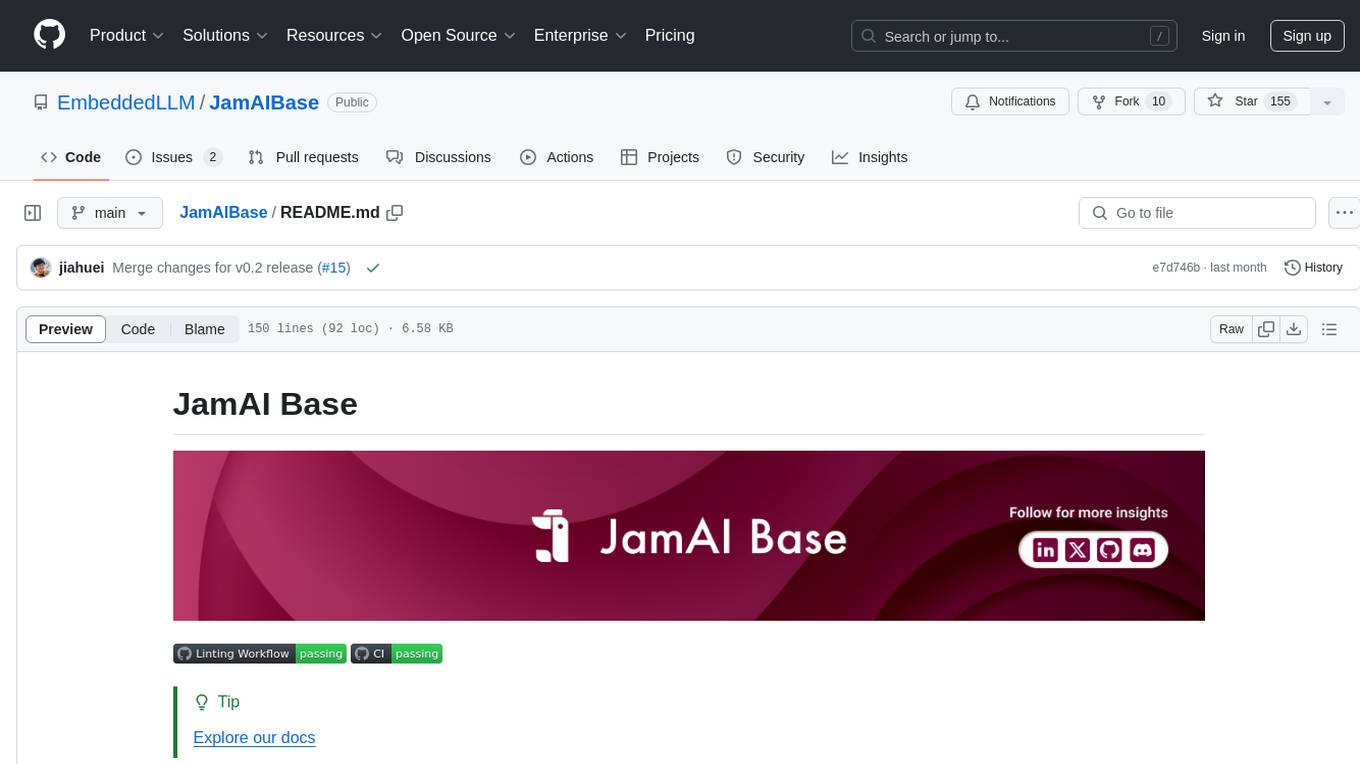
JamAIBase
JamAI Base is an open-source platform integrating SQLite and LanceDB databases with managed memory and RAG capabilities. It offers built-in LLM, vector embeddings, and reranker orchestration accessible through a spreadsheet-like UI and REST API. Users can transform static tables into dynamic entities, facilitate real-time interactions, manage structured data, and simplify chatbot development. The tool focuses on ease of use, scalability, flexibility, declarative paradigm, and innovative RAG techniques, making complex data operations accessible to users with varying technical expertise.
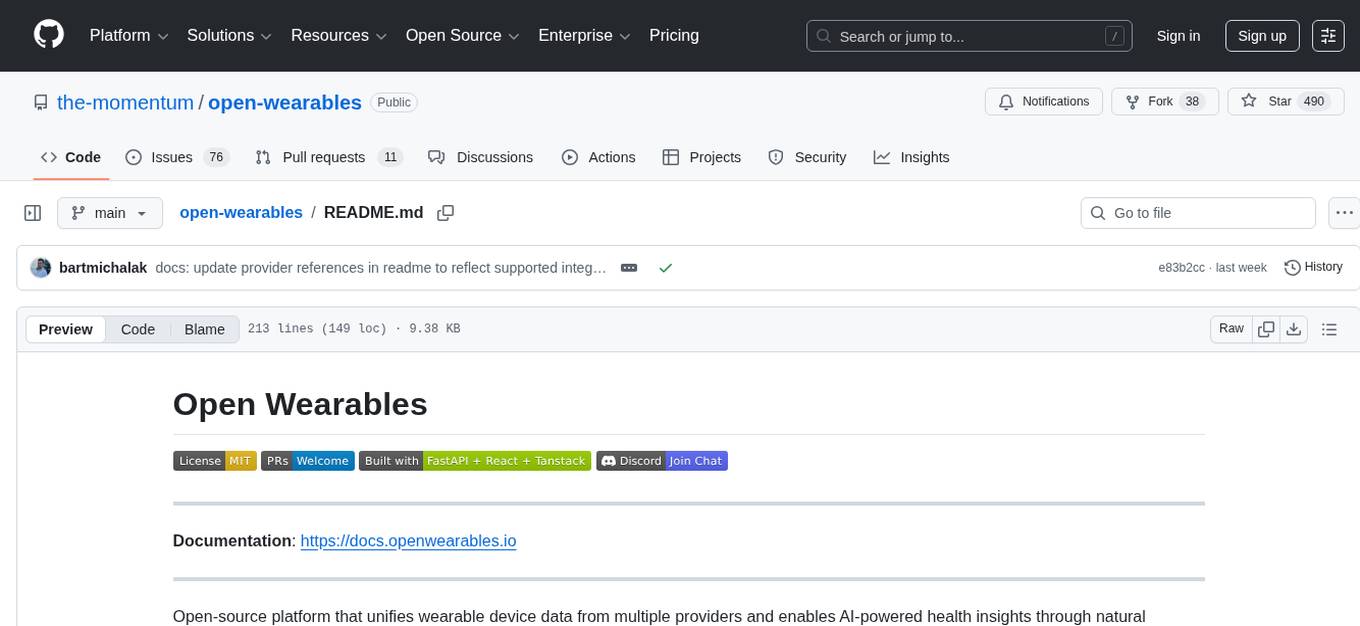
open-wearables
Open Wearables is an open-source platform that unifies wearable device data from multiple providers and enables AI-powered health insights through natural language automations. It provides a single API for building health applications faster, with embeddable widgets and webhook notifications. Developers can integrate multiple wearable providers, access normalized health data, and build AI-powered insights. The platform simplifies the process of supporting multiple wearables, handling OAuth flows, data mapping, and sync logic, allowing users to focus on product development. Use cases include fitness coaching apps, healthcare platforms, wellness applications, research projects, and personal use.
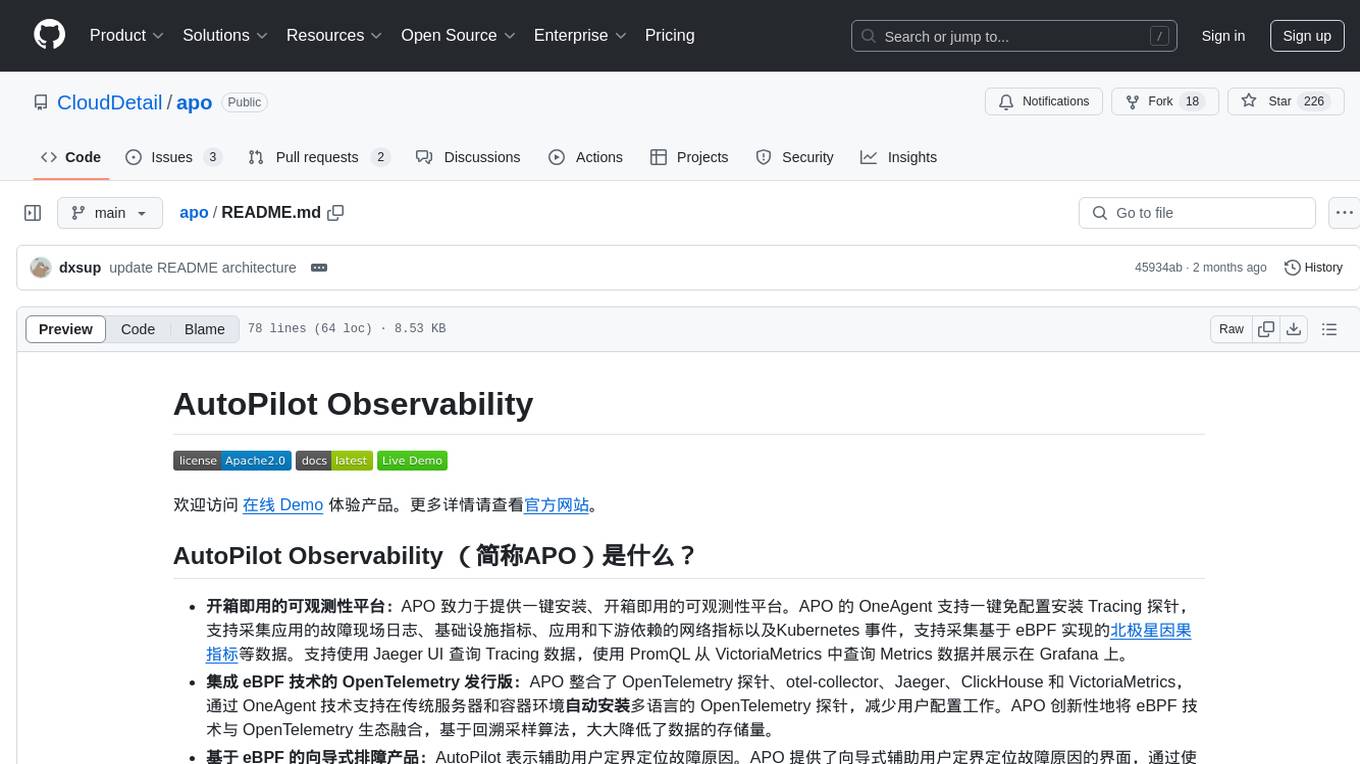
apo
AutoPilot Observability (APO) is an out-of-the-box observability platform that provides one-click installation and ready-to-use capabilities. APO's OneAgent supports one-click configuration-free installation of Tracing probes, collects application fault scene logs, infrastructure metrics, network metrics of applications and downstream dependencies, and Kubernetes events. It supports collecting causality metrics based on eBPF implementation. APO integrates OpenTelemetry probes, otel-collector, Jaeger, ClickHouse, and VictoriaMetrics, reducing user configuration work. APO innovatively integrates eBPF technology with the OpenTelemetry ecosystem, significantly reducing data storage volume. It offers guided troubleshooting using eBPF technology to assist users in pinpointing fault causes on a single page.
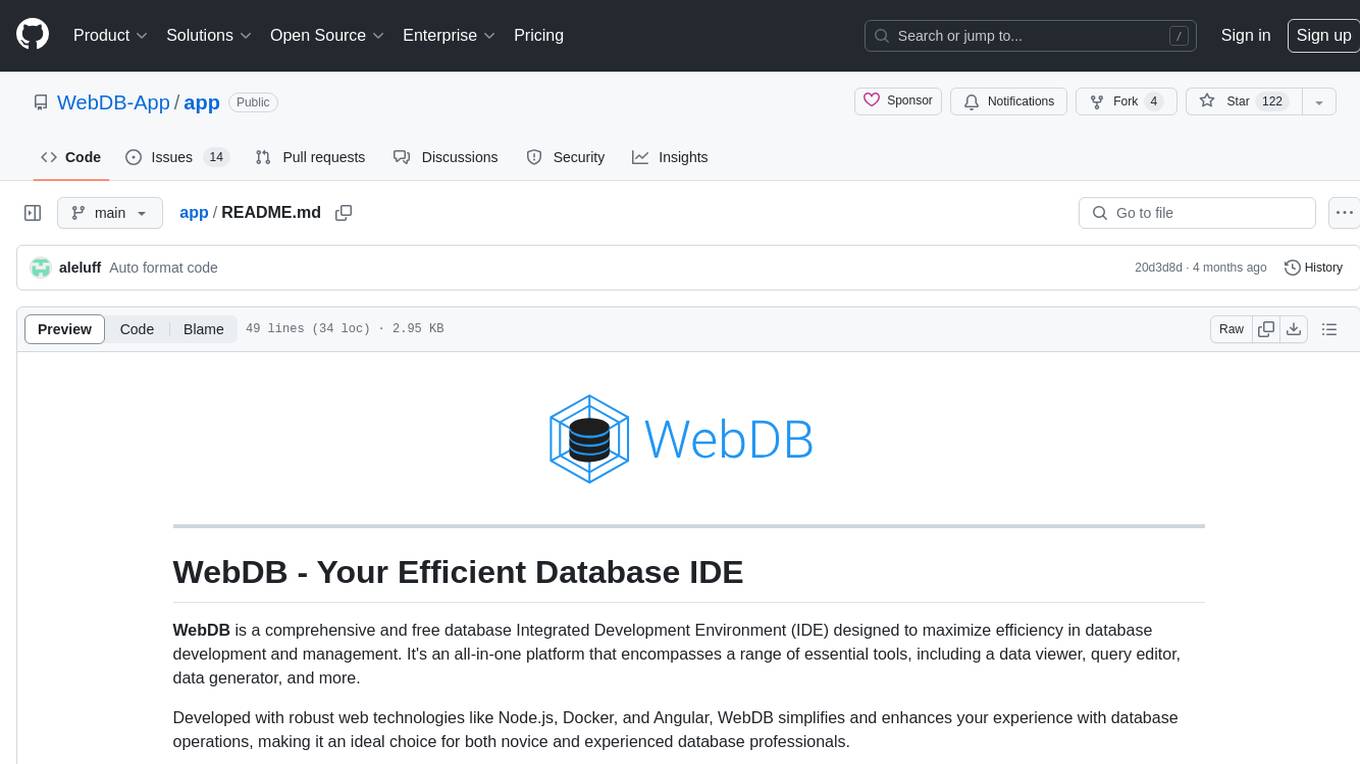
app
WebDB is a comprehensive and free database Integrated Development Environment (IDE) designed to maximize efficiency in database development and management. It simplifies and enhances database operations with features like DBMS discovery, query editor, time machine, NoSQL structure inferring, modern ERD visualization, and intelligent data generator. Developed with robust web technologies, WebDB is suitable for both novice and experienced database professionals.
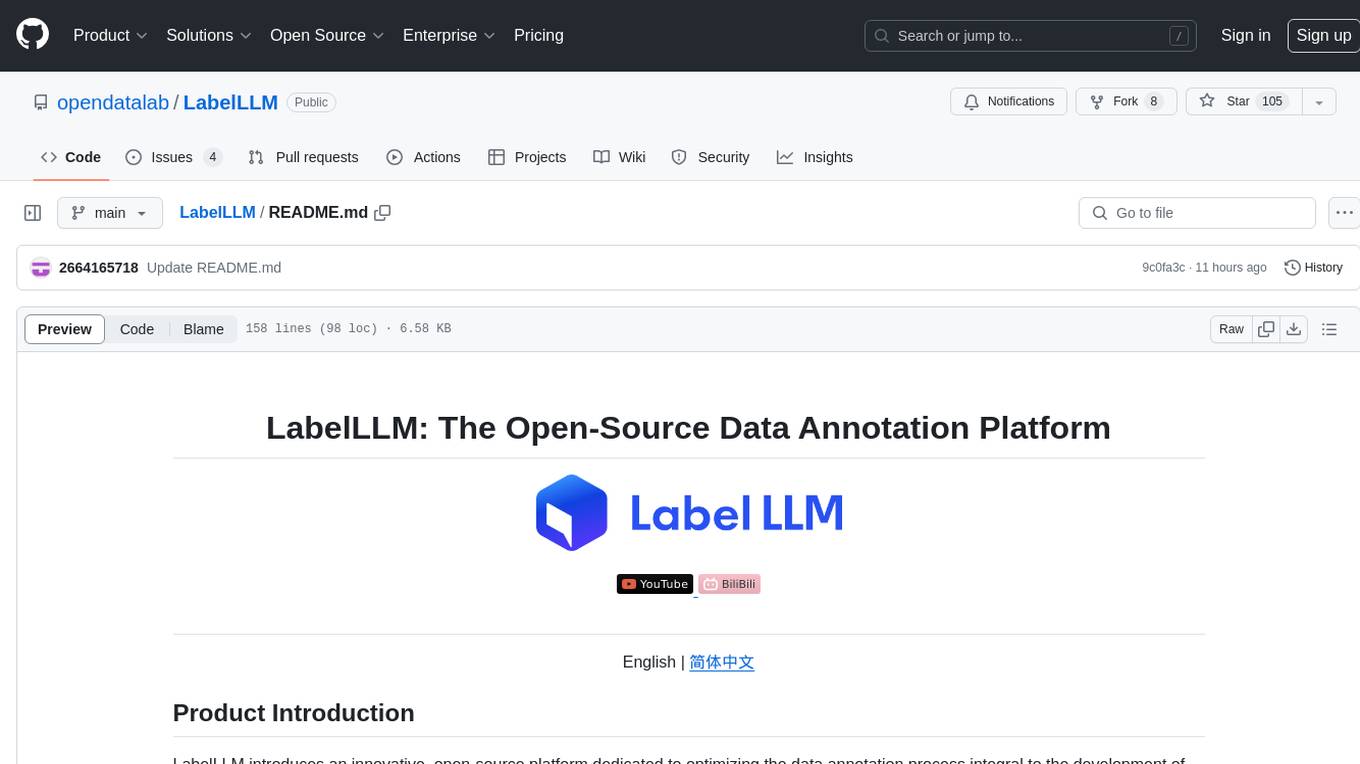
LabelLLM
LabelLLM is an open-source data annotation platform designed to optimize the data annotation process for LLM development. It offers flexible configuration, multimodal data support, comprehensive task management, and AI-assisted annotation. Users can access a suite of annotation tools, enjoy a user-friendly experience, and enhance efficiency. The platform allows real-time monitoring of annotation progress and quality control, ensuring data integrity and timeliness.
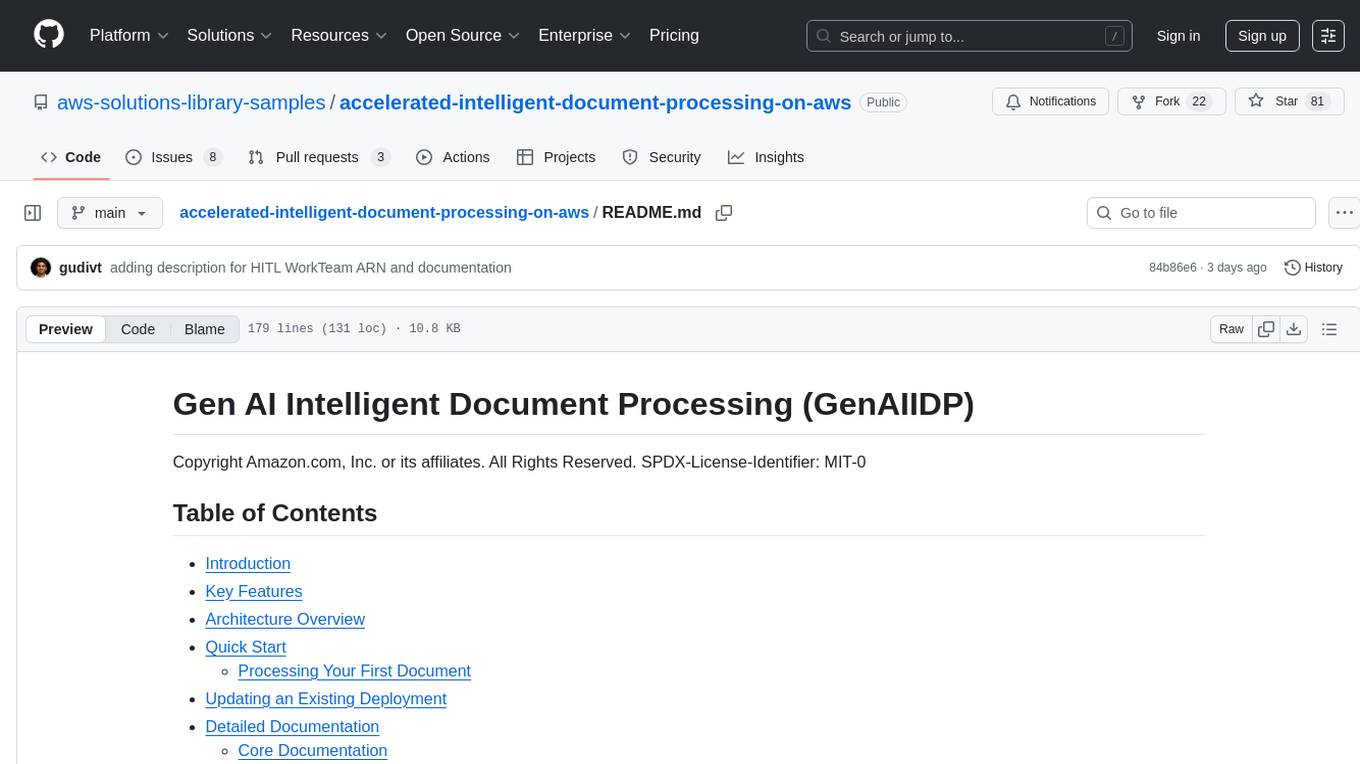
accelerated-intelligent-document-processing-on-aws
Accelerated Intelligent Document Processing on AWS is a scalable, serverless solution for automated document processing and information extraction using AWS services. It combines OCR capabilities with generative AI to convert unstructured documents into structured data at scale. The solution features a serverless architecture built on AWS technologies, modular processing patterns, advanced classification support, few-shot example support, custom business logic integration, high throughput processing, built-in resilience, cost optimization, comprehensive monitoring, web user interface, human-in-the-loop integration, AI-powered evaluation, extraction confidence assessment, and document knowledge base query. The architecture uses nested CloudFormation stacks to support multiple document processing patterns while maintaining common infrastructure for queueing, tracking, and monitoring.
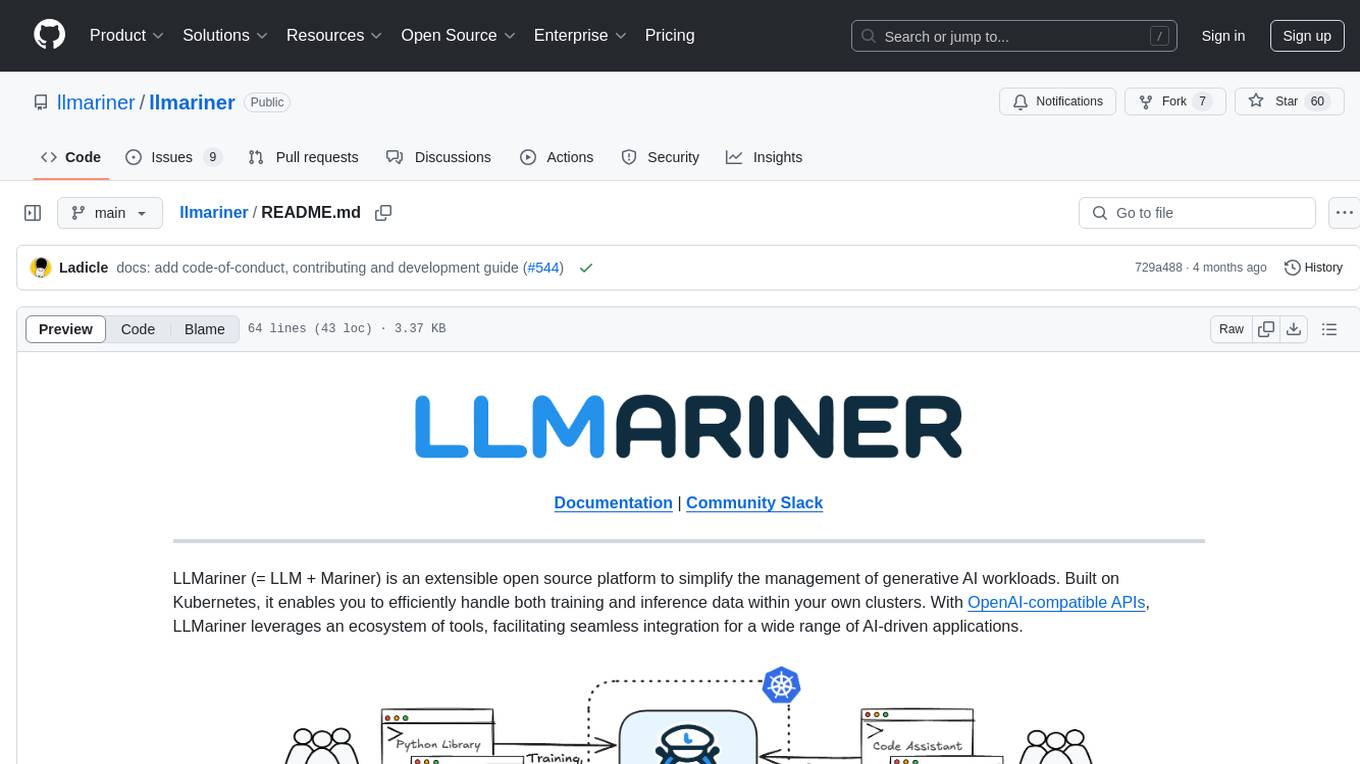
llmariner
LLMariner is an extensible open source platform built on Kubernetes to simplify the management of generative AI workloads. It enables efficient handling of training and inference data within clusters, with OpenAI-compatible APIs for seamless integration with a wide range of AI-driven applications.
For similar tasks

seatunnel
SeaTunnel is a high-performance, distributed data integration tool trusted by numerous companies for synchronizing vast amounts of data daily. It addresses common data integration challenges by seamlessly integrating with diverse data sources, supporting multimodal data integration, complex synchronization scenarios, resource efficiency, and quality monitoring. With over 100 connectors, SeaTunnel offers batch-stream integration, distributed snapshot algorithm, multi-engine support, JDBC multiplexing, and log parsing. It provides high throughput, low latency, real-time monitoring, and supports two job development methods. Users can configure jobs, select execution engines, and parallelize data using source connectors. SeaTunnel also supports multimodal data integration, Apache SeaTunnel tools, real-world use cases, and visual management of jobs through the SeaTunnel Web Project.
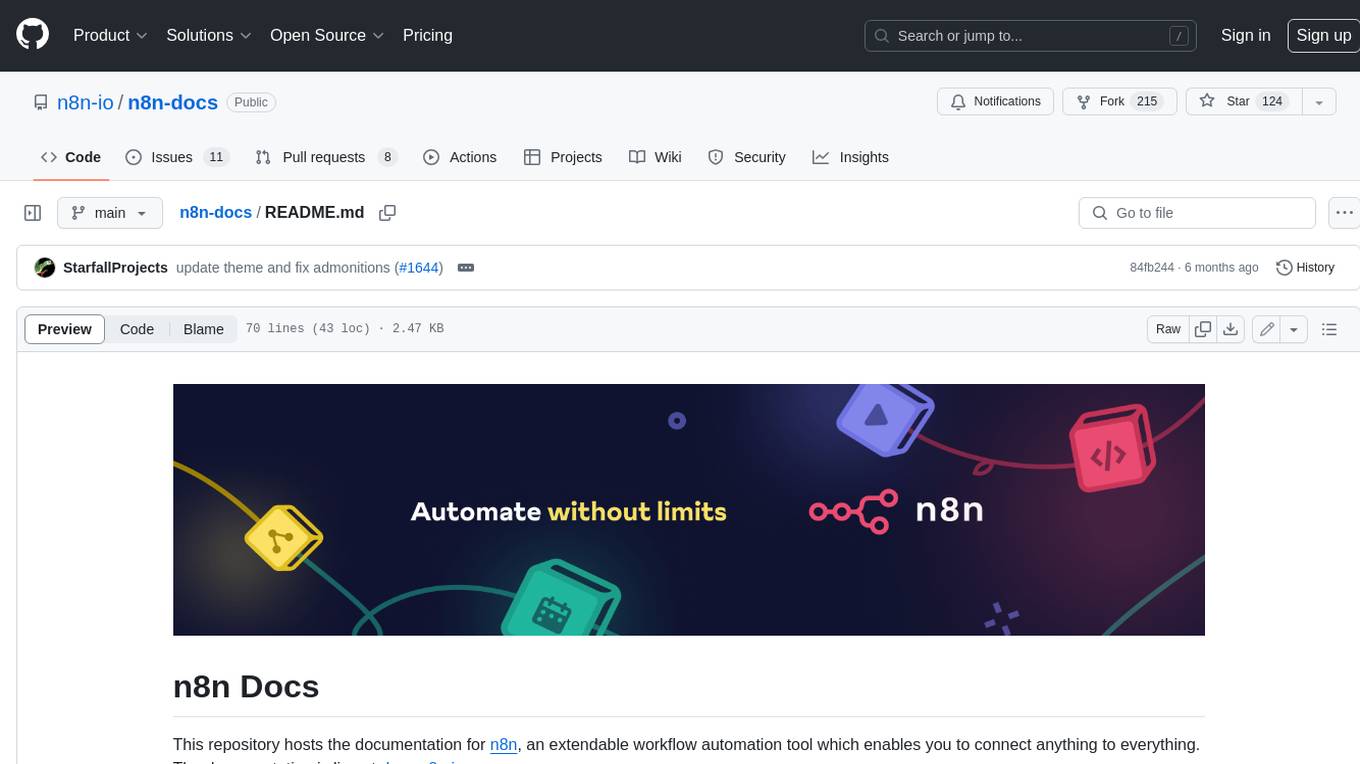
n8n-docs
n8n is an extendable workflow automation tool that enables you to connect anything to everything. It is open-source and can be self-hosted or used as a service. n8n provides a visual interface for creating workflows, which can be used to automate tasks such as data integration, data transformation, and data analysis. n8n also includes a library of pre-built nodes that can be used to connect to a variety of applications and services. This makes it easy to create complex workflows without having to write any code.
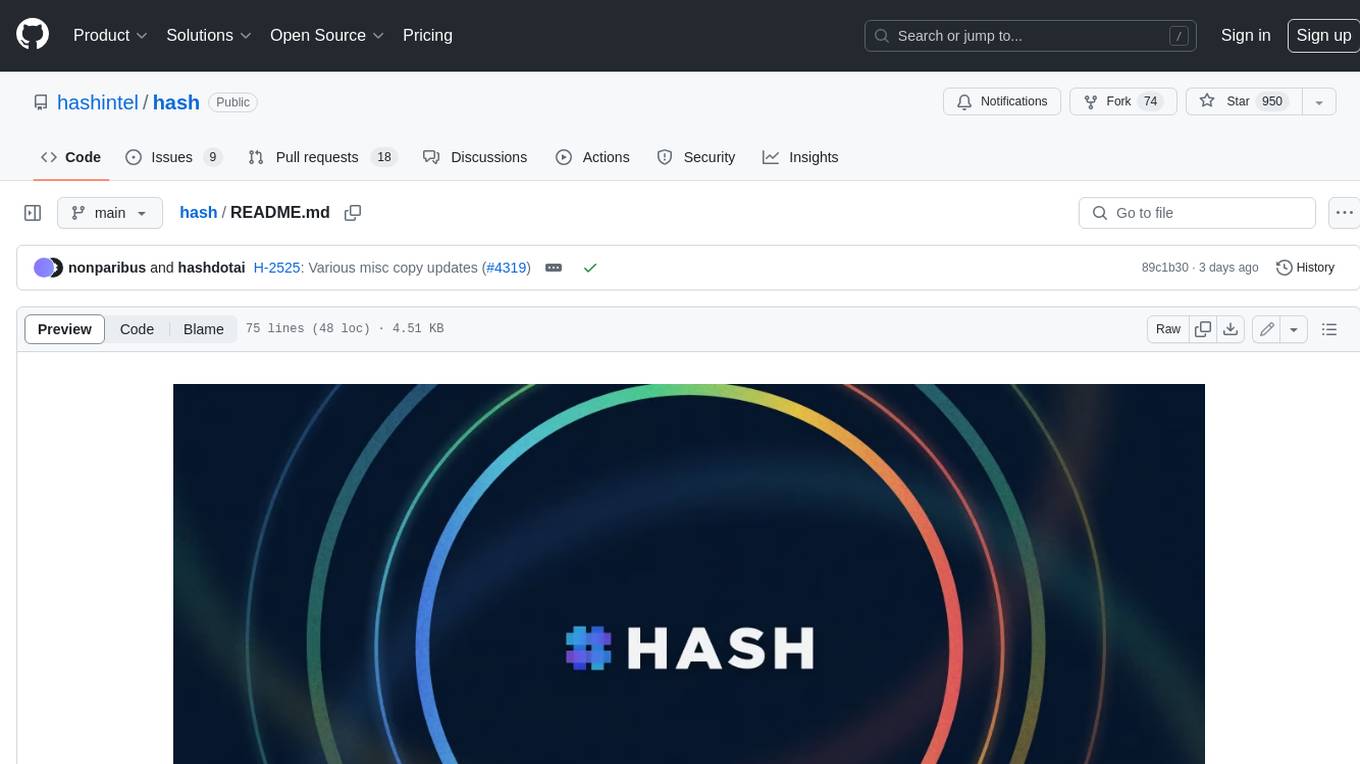
hash
HASH is a self-building, open-source database which grows, structures and checks itself. With it, we're creating a platform for decision-making, which helps you integrate, understand and use data in a variety of different ways.
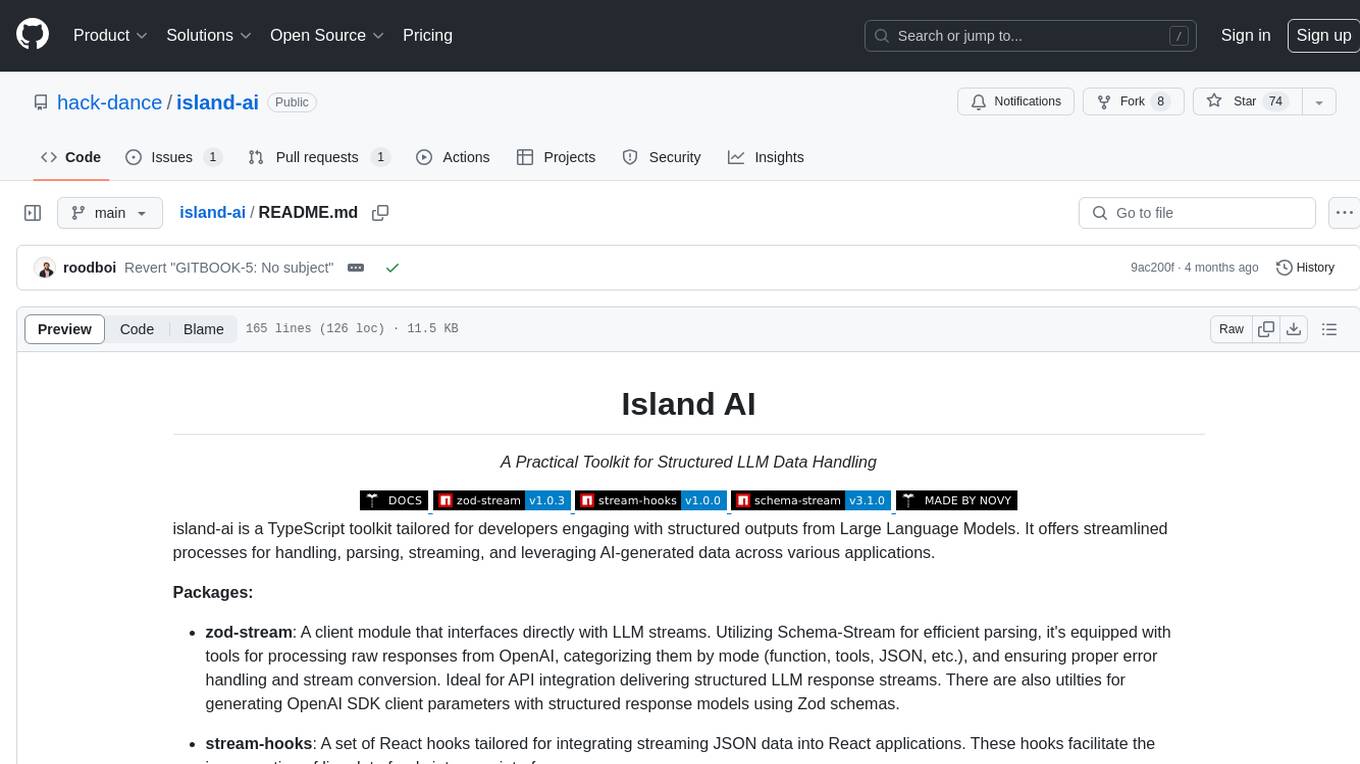
island-ai
island-ai is a TypeScript toolkit tailored for developers engaging with structured outputs from Large Language Models. It offers streamlined processes for handling, parsing, streaming, and leveraging AI-generated data across various applications. The toolkit includes packages like zod-stream for interfacing with LLM streams, stream-hooks for integrating streaming JSON data into React applications, and schema-stream for JSON streaming parsing based on Zod schemas. Additionally, related packages like @instructor-ai/instructor-js focus on data validation and retry mechanisms, enhancing the reliability of data processing workflows.
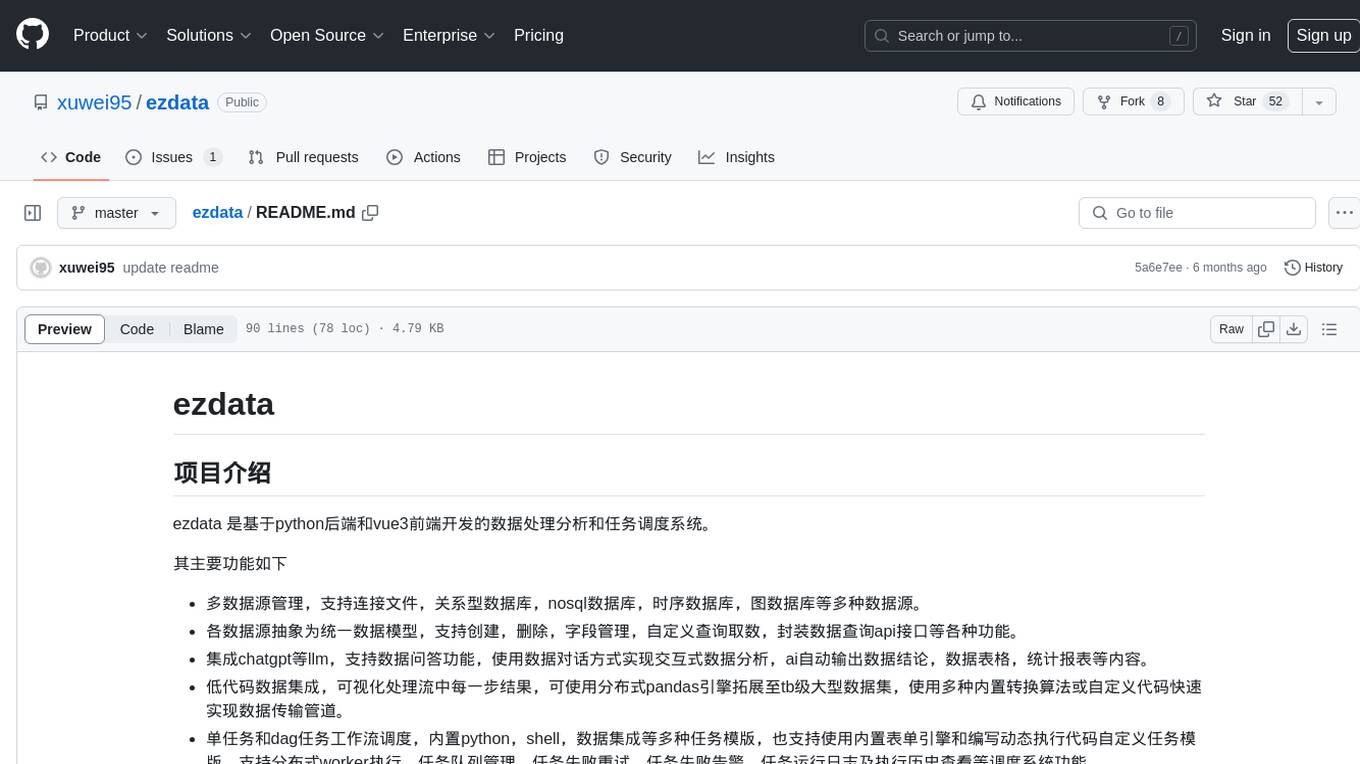
ezdata
Ezdata is a data processing and task scheduling system developed based on Python backend and Vue3 frontend. It supports managing multiple data sources, abstracting various data sources into a unified data model, integrating chatgpt for data question and answer functionality, enabling low-code data integration and visualization processing, scheduling single and dag tasks, and integrating a low-code data visualization dashboard system.

buildel
Buildel is an AI automation platform that empowers users to create versatile workflows without writing code. It supports multiple providers and interfaces, offers pre-built use cases, and allows users to bring their own API keys. Ideal for AI-powered document retrieval, conversational interfaces, and data integration. Users can get started at app.buildel.ai or run Buildel locally with Node.js, Elixir/Erlang, Docker, Git, and JQ installed. Join the community on Discord for support and discussions.
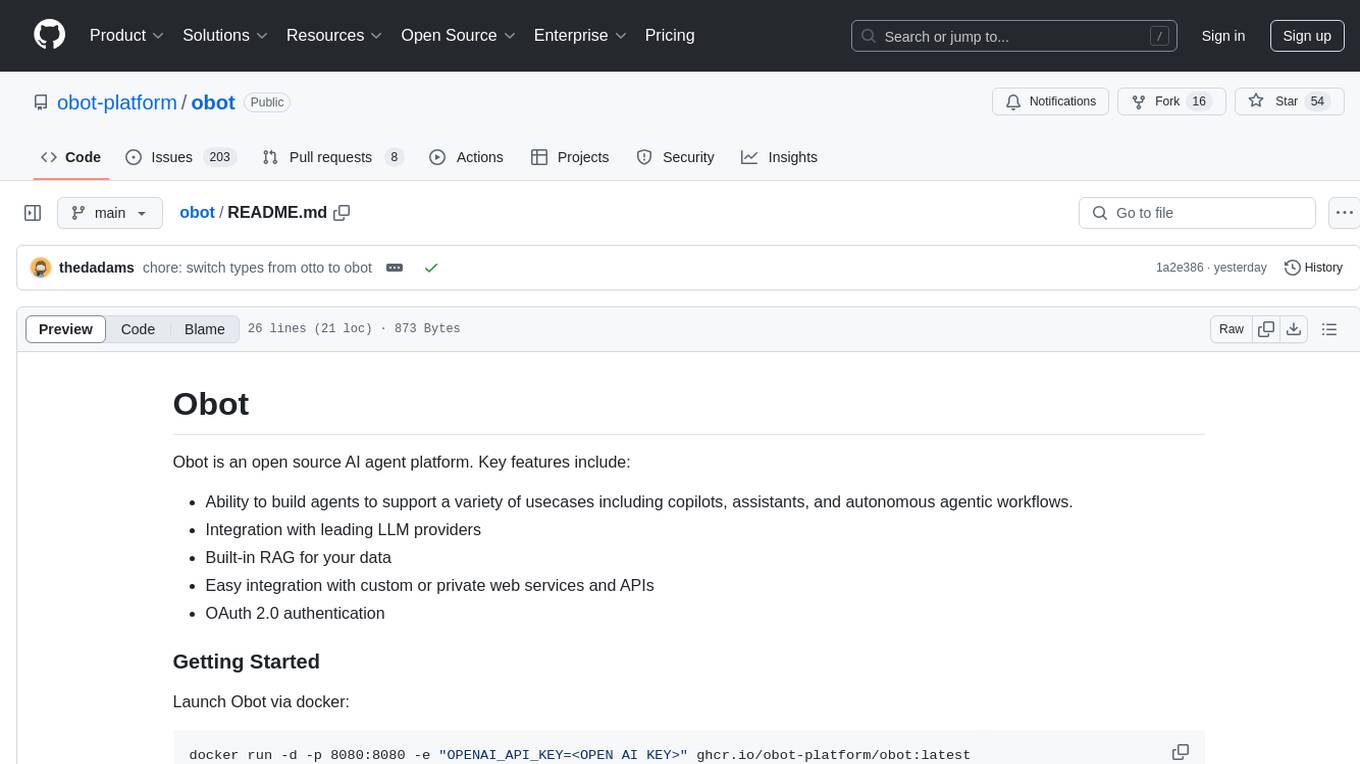
obot
Obot is an open source AI agent platform that allows users to build agents for various use cases such as copilots, assistants, and autonomous workflows. It offers integration with leading LLM providers, built-in RAG for data, easy integration with custom web services and APIs, and OAuth 2.0 authentication.
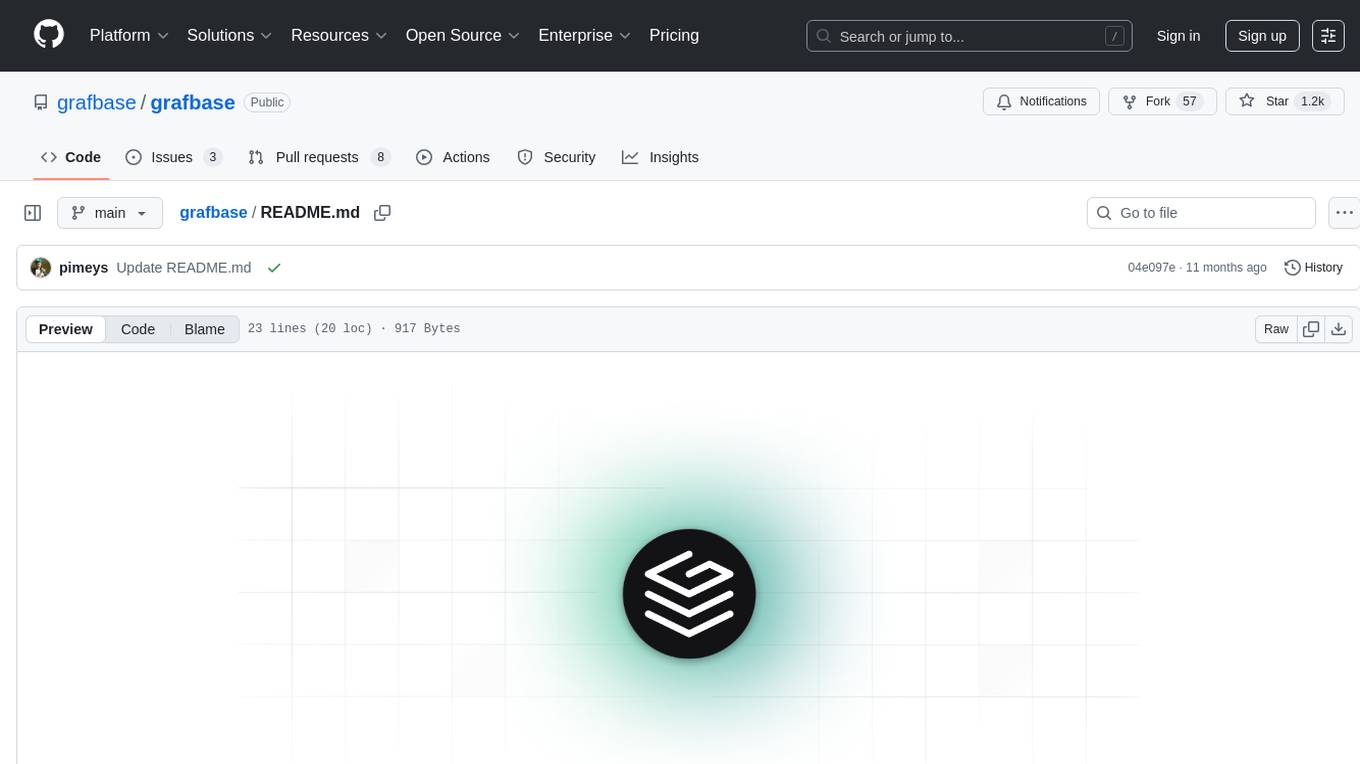
grafbase
Grafbase is a GraphQL Federation platform that allows users to compose all their data sources into a unified graph. It helps users move faster without breaking things by providing advanced governance and analytics features.
For similar jobs

databerry
Chaindesk is a no-code platform that allows users to easily set up a semantic search system for personal data without technical knowledge. It supports loading data from various sources such as raw text, web pages, files (Word, Excel, PowerPoint, PDF, Markdown, Plain Text), and upcoming support for web sites, Notion, and Airtable. The platform offers a user-friendly interface for managing datastores, querying data via a secure API endpoint, and auto-generating ChatGPT Plugins for each datastore. Chaindesk utilizes a Vector Database (Qdrant), Openai's text-embedding-ada-002 for embeddings, and has a chunk size of 1024 tokens. The technology stack includes Next.js, Joy UI, LangchainJS, PostgreSQL, Prisma, and Qdrant, inspired by the ChatGPT Retrieval Plugin.
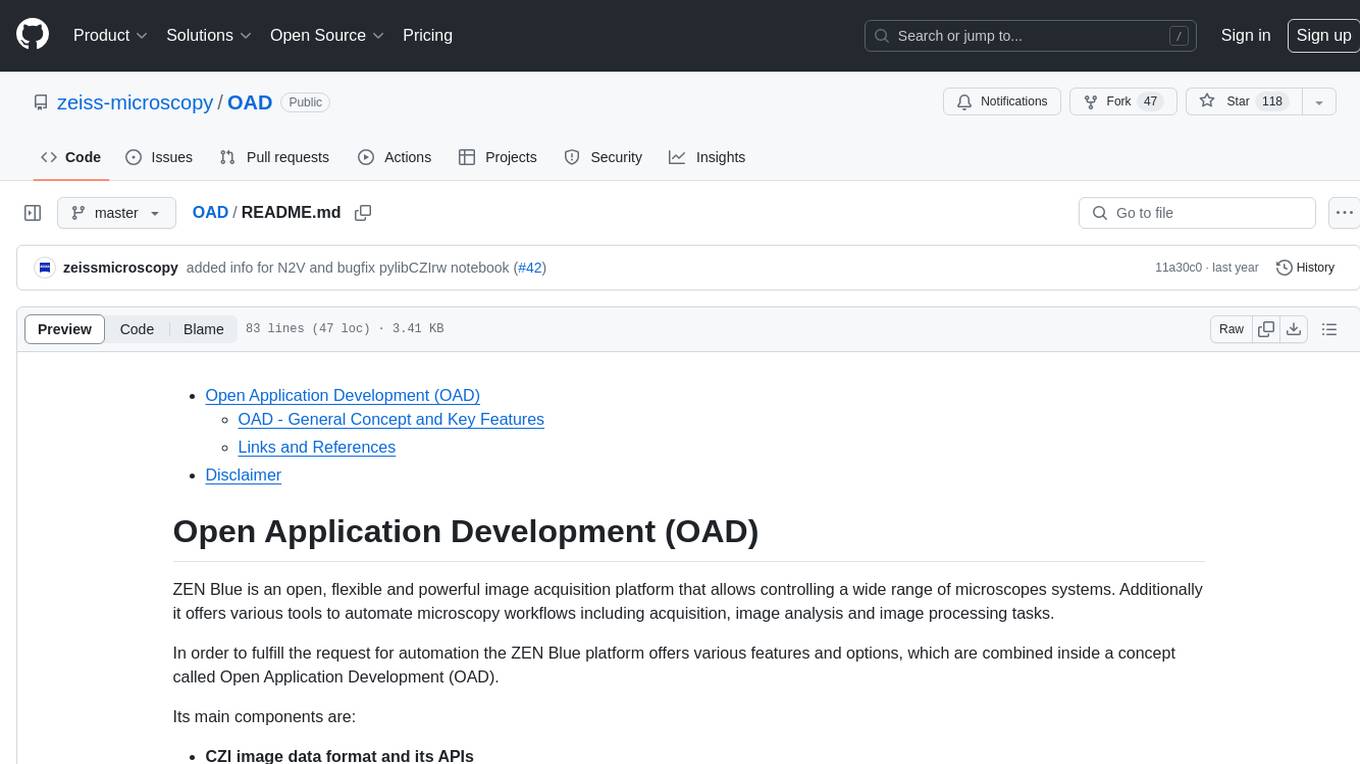
OAD
OAD is a powerful open-source tool for analyzing and visualizing data. It provides a user-friendly interface for exploring datasets, generating insights, and creating interactive visualizations. With OAD, users can easily import data from various sources, clean and preprocess data, perform statistical analysis, and create customizable visualizations to communicate findings effectively. Whether you are a data scientist, analyst, or researcher, OAD can help you streamline your data analysis workflow and uncover valuable insights from your data.
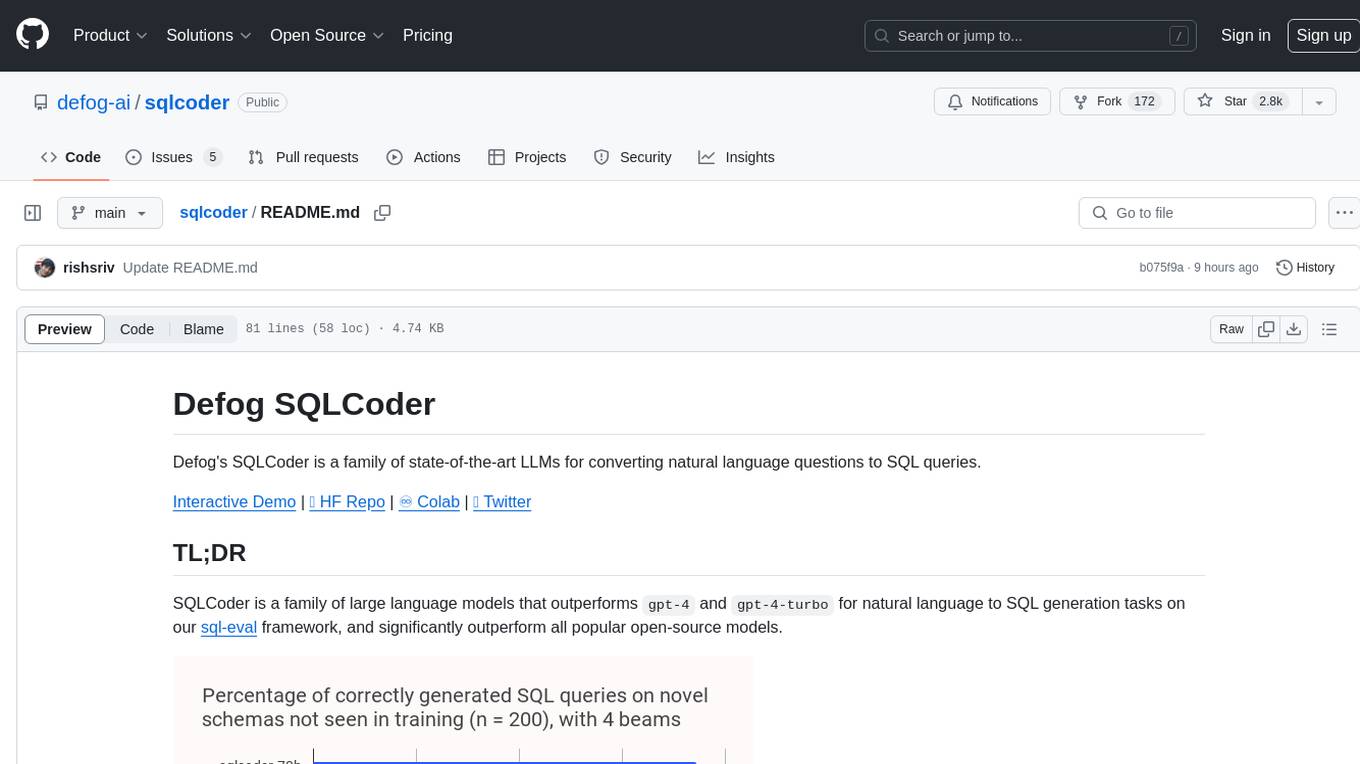
sqlcoder
Defog's SQLCoder is a family of state-of-the-art large language models (LLMs) designed for converting natural language questions into SQL queries. It outperforms popular open-source models like gpt-4 and gpt-4-turbo on SQL generation tasks. SQLCoder has been trained on more than 20,000 human-curated questions based on 10 different schemas, and the model weights are licensed under CC BY-SA 4.0. Users can interact with SQLCoder through the 'transformers' library and run queries using the 'sqlcoder launch' command in the terminal. The tool has been tested on NVIDIA GPUs with more than 16GB VRAM and Apple Silicon devices with some limitations. SQLCoder offers a demo on their website and supports quantized versions of the model for consumer GPUs with sufficient memory.
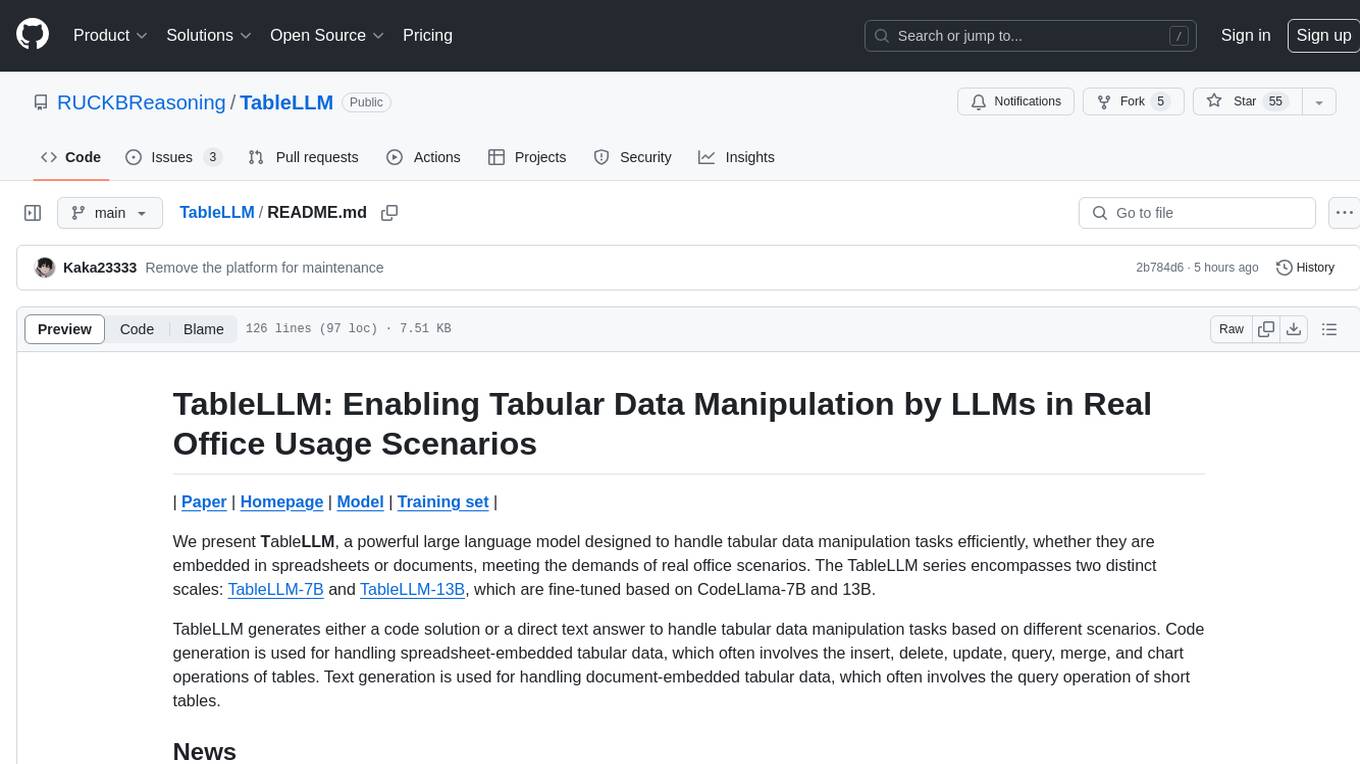
TableLLM
TableLLM is a large language model designed for efficient tabular data manipulation tasks in real office scenarios. It can generate code solutions or direct text answers for tasks like insert, delete, update, query, merge, and chart operations on tables embedded in spreadsheets or documents. The model has been fine-tuned based on CodeLlama-7B and 13B, offering two scales: TableLLM-7B and TableLLM-13B. Evaluation results show its performance on benchmarks like WikiSQL, Spider, and self-created table operation benchmark. Users can use TableLLM for code and text generation tasks on tabular data.
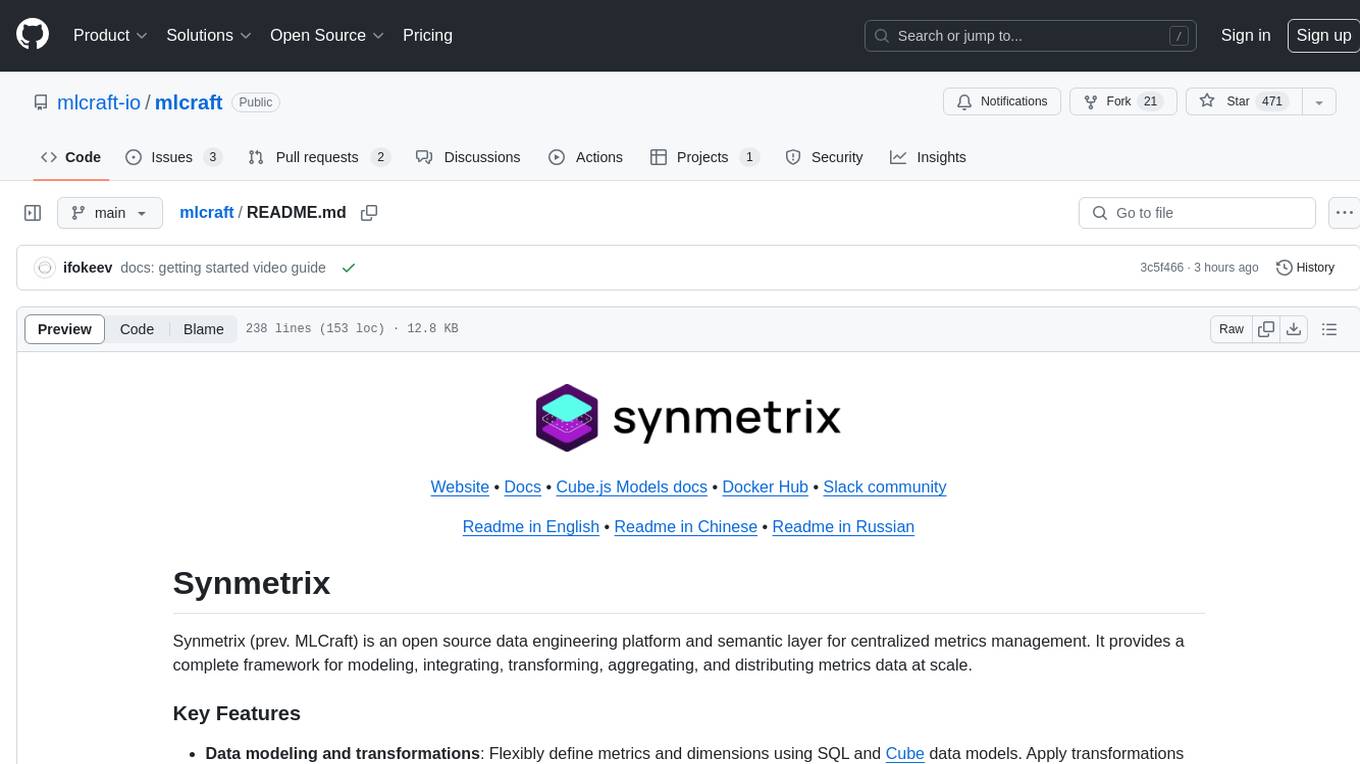
mlcraft
Synmetrix (prev. MLCraft) is an open source data engineering platform and semantic layer for centralized metrics management. It provides a complete framework for modeling, integrating, transforming, aggregating, and distributing metrics data at scale. Key features include data modeling and transformations, semantic layer for unified data model, scheduled reports and alerts, versioning, role-based access control, data exploration, caching, and collaboration on metrics modeling. Synmetrix leverages Cube (Cube.js) for flexible data models that consolidate metrics from various sources, enabling downstream distribution via a SQL API for integration into BI tools, reporting, dashboards, and data science. Use cases include data democratization, business intelligence, embedded analytics, and enhancing accuracy in data handling and queries. The tool speeds up data-driven workflows from metrics definition to consumption by combining data engineering best practices with self-service analytics capabilities.
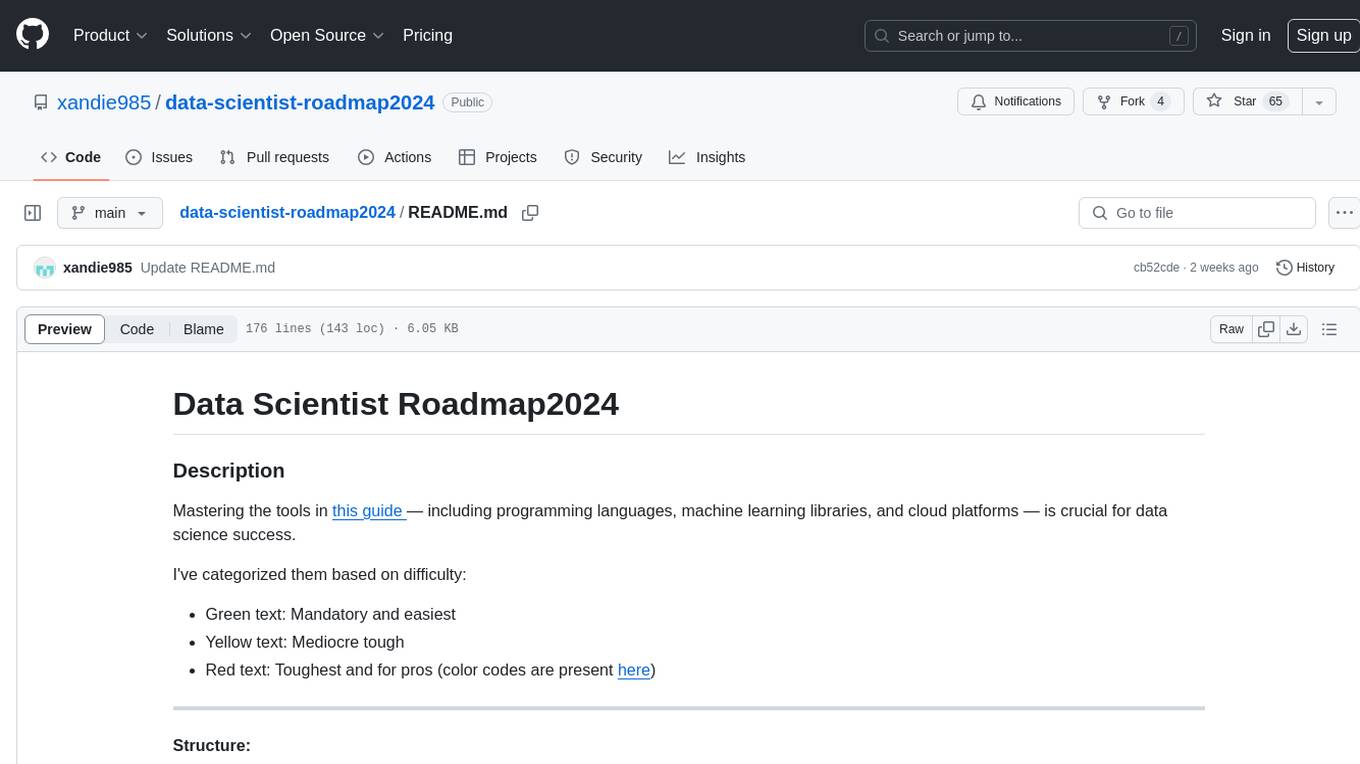
data-scientist-roadmap2024
The Data Scientist Roadmap2024 provides a comprehensive guide to mastering essential tools for data science success. It includes programming languages, machine learning libraries, cloud platforms, and concepts categorized by difficulty. The roadmap covers a wide range of topics from programming languages to machine learning techniques, data visualization tools, and DevOps/MLOps tools. It also includes web development frameworks and specific concepts like supervised and unsupervised learning, NLP, deep learning, reinforcement learning, and statistics. Additionally, it delves into DevOps tools like Airflow and MLFlow, data visualization tools like Tableau and Matplotlib, and other topics such as ETL processes, optimization algorithms, and financial modeling.
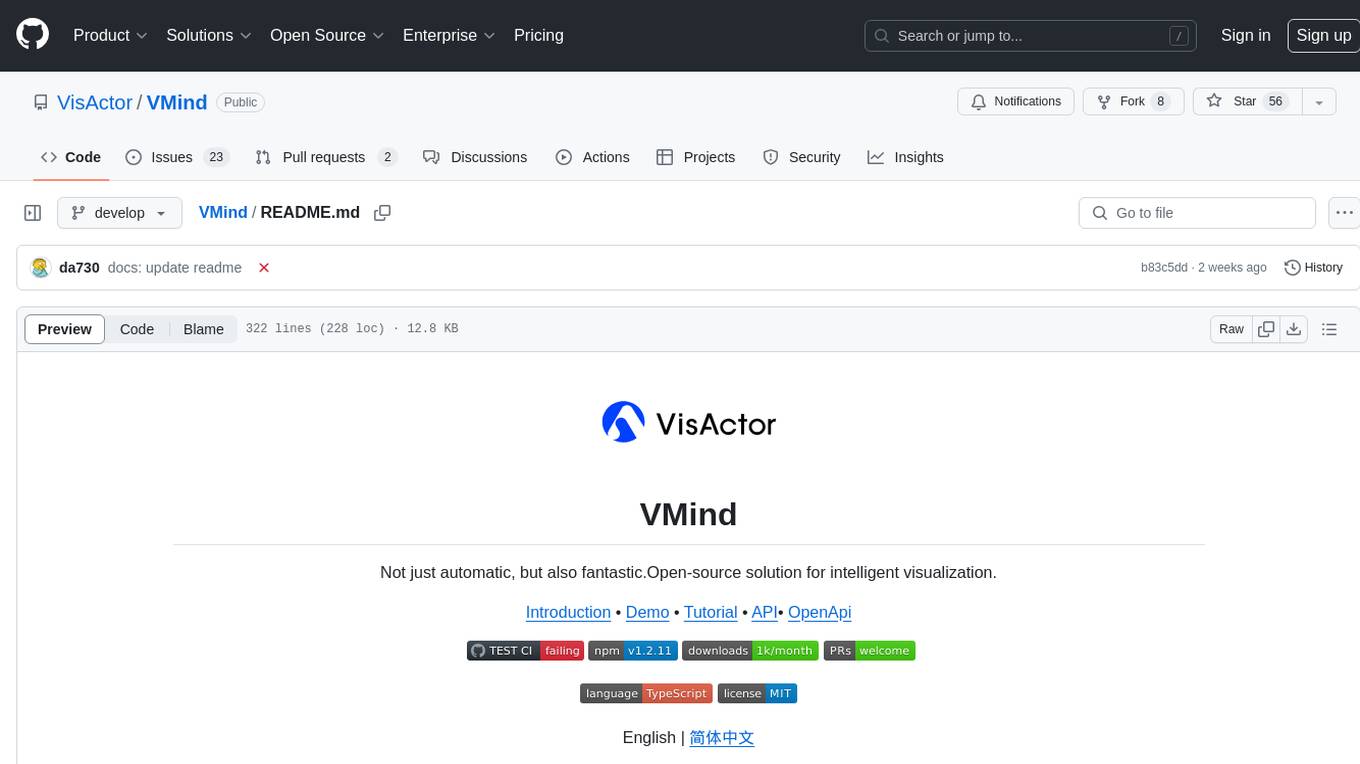
VMind
VMind is an open-source solution for intelligent visualization, providing an intelligent chart component based on LLM by VisActor. It allows users to create chart narrative works with natural language interaction, edit charts through dialogue, and export narratives as videos or GIFs. The tool is easy to use, scalable, supports various chart types, and offers one-click export functionality. Users can customize chart styles, specify themes, and aggregate data using LLM models. VMind aims to enhance efficiency in creating data visualization works through dialogue-based editing and natural language interaction.
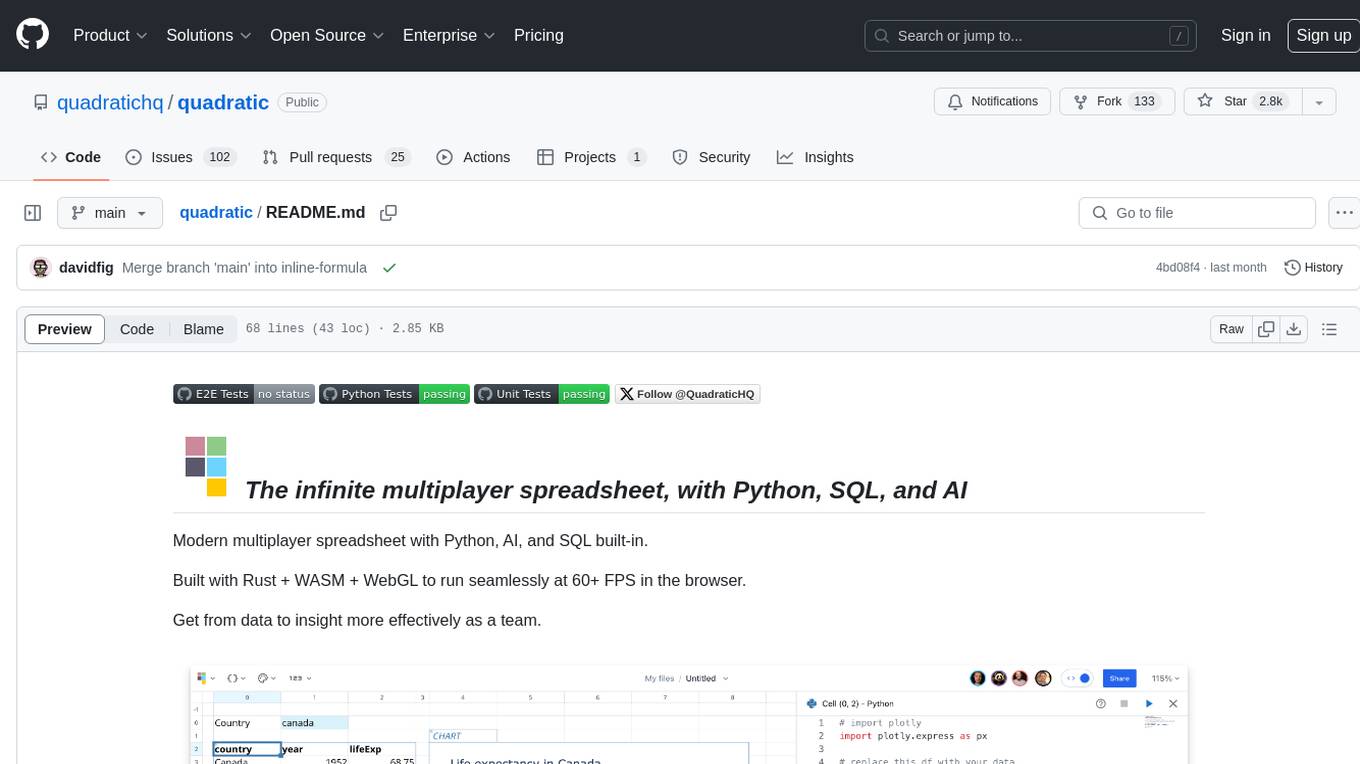
quadratic
Quadratic is a modern multiplayer spreadsheet application that integrates Python, AI, and SQL functionalities. It aims to streamline team collaboration and data analysis by enabling users to pull data from various sources and utilize popular data science tools. The application supports building dashboards, creating internal tools, mixing data from different sources, exploring data for insights, visualizing Python workflows, and facilitating collaboration between technical and non-technical team members. Quadratic is built with Rust + WASM + WebGL to ensure seamless performance in the browser, and it offers features like WebGL Grid, local file management, Python and Pandas support, Excel formula support, multiplayer capabilities, charts and graphs, and team support. The tool is currently in Beta with ongoing development for additional features like JS support, SQL database support, and AI auto-complete.



